AlgoD&A_LectureNotes_W8
god is a girl歌词
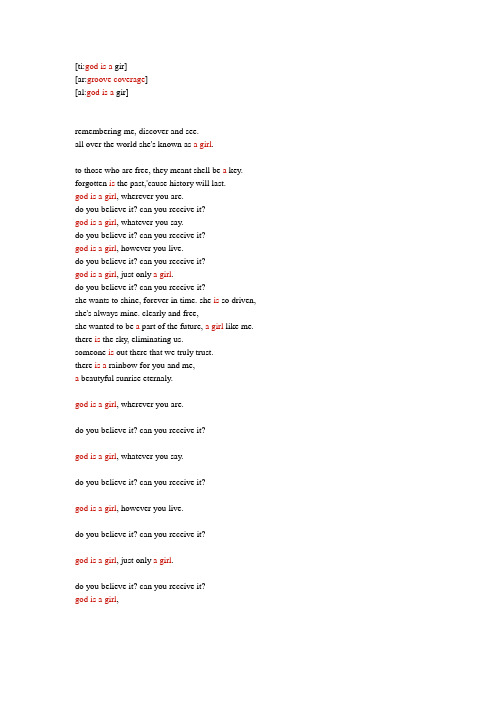
[ti:god is a gir][ar:groove coverage][al:god is a gir]remembering me, discover and see.all over the world she's known as a girl.to those who are free, they meant shell be a key. forgotten is the past,'cause history will last.god is a girl, wherever you are.do you believe it? can you receive it?god is a girl, whatever you say.do you believe it? can you receive it?god is a girl, however you live.do you believe it? can you receive it?god is a girl, just only a girl.do you believe it? can you receive it?she wants to shine, forever in time. she is so driven, she's always mine. clearly and free,she wanted to be a part of the future, a girl like me. there is the sky, eliminating us.someone is out there that we truly trust.there is a rainbow for you and me,a beautyful sunrise eternaly.god is a girl, wherever you are.do you believe it? can you receive it?god is a girl, whatever you say.do you believe it? can you receive it?god is a girl, however you live.do you believe it? can you receive it?god is a girl, just only a girl.do you believe it? can you receive it?god is a girl,。
源自希腊神话的英语词汇
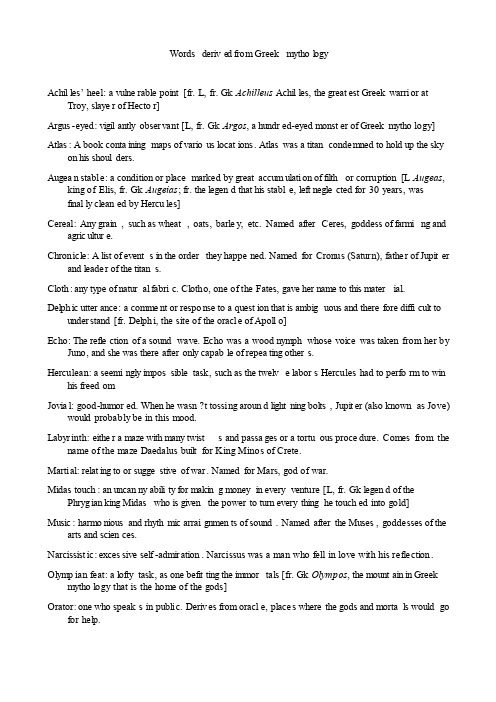
Wordsderive d from Greekmythol ogyAchill es’ heel: a vulner ablepoint[fr. L, fr. Gk Achill eus Achill es, the greate st Greekwarrio r at Troy, slayer of Hector]Argus-eyed: vigila ntlyobserv ant [L, fr. Gk Argos, a hundre d-eyed monste r of Greekmythol ogy] Atlas: A book contai ningmaps of variou s locati ons. Atlaswas a titancondem ned to hold up the sky on his should ers.Augean stable: a condit ion or placemarked by greataccumu latio n of filthor corrup tion[L Augeas, king of Elis, fr. Gk Augeia s; fr. the legend that his stable, left neglec ted for 30 years, wasfinall y cleane d by Hercul es]Cereal: Any grain,such as wheat,oats, barley, etc. NamedafterCeres,goddes s of farmin g and agricu lture.Chroni cle: A list of events in the orderthey happen ed. Namedfor Cronus (Saturn), father of Jupite r and leader of the titans.Cloth: any type of natura l fabric. Clotho, one of the Fates, gave her name to this materi al.Delphi c uttera nce: a commen t or respon se to a questi on that is ambigu ous and theref ore diffic ult to unders tand[fr. Delphi, the site of the oracle of Apollo]Echo: The reflec tionof a soundwave. Echo was a wood nymphwhosevoicewas takenfrom her by Juno, and she was therea fteronly capabl e of repeat ing others.Hercul ean: a seemin gly imposs ibletask, such as the twelve labors Hercul es had to perfor m to win his freedo mJovial: good-humore d. When he wasn?t tossin g around lightn ing bolts, Jupite r (also knownas Jove) wouldprobab ly be in this mood.Labyri nth: either a maze with many twists and passag es or a tortuo us proced ure. Comesfrom the name of the maze Daedal us builtfor King Minosof Crete.Martia l: relati ng to or sugges tiveof war. Namedfor Mars, god of war.Midastouch: an uncann y abilit y for making moneyin everyventur e [L, fr. Gk legend of the Phrygi an king Midaswho is giventhe powerto turn everyt hinghe touche d into gold]Music:harmon iousand rhythm ic arraig nment s of sound. Namedafterthe Muses,goddes ses of the arts and scienc es.Narcis sisti c: excess ive self-admira tion. Narcis sus was a man who fell in love with his reflec tion. Olympi an feat: a loftytask, as one befitt ing the immort als [fr. Gk Olympo s, the mounta in in Greekmythol ogy that is the home of the gods]Orator: one who speaks in public. Derive s from oracle, places wherethe gods and mortal s wouldgo for help.Pandor a’s box: a prolif ic source of troubl es [fr. the myth surrou nding the box sent by the gods to Pandor a]Panic: a sudden, intens e, contag iousfear. The god Pan was knownfor causin g such fear in people. Plutoc rat: govern mentof rich people. Plutolivedin the underw orld, surrou ndedby minera l wealth. procru stean bed: a scheme or patter n into whichsomeon e or someth ing is arbitr arily forced [L, fr.Gk Prokro ustes Procru stes, a villai nousson of Poseid on in Greekmythol ogy who forcestravel ers to fit into his bed by stretc hingtheirbodies or cuttin g off theirlegs]Psyche: The soul or mind, namedfor Psyche, the wife of Cupid.Python: a massiv e snakethat killsits prey by constr ictio n. NamedafterPython, a monste r that livedin a cave near Delphi and was killed by Apollo.sirensong: an alluri ng uttera nce or appeal, especi allyone that is seduct ive or decept ive [ME sereyn, fr. OF serein e, fr. L Siren, fr. Gk Serein Siren, one of severa l mythol ogica l Greeksea nymphs, part womanand part bird, suppos ed to lure sailor s to theirdestru ction by theirseduct ivesingin g]Struck by Cupid’s arrow: smitte n, in love [L Cupido, the Romangod of erotic love]Titani c: of massiv e size, like the titans, the gigant ic sons of Uranus and Gaia.。
国际贸易常用英语缩写
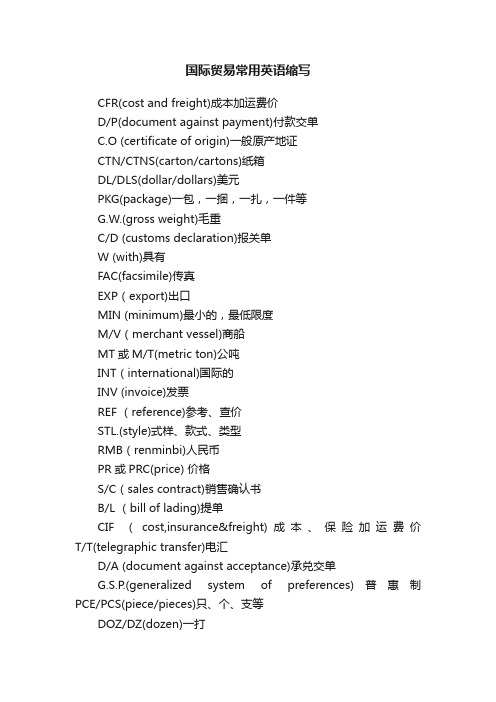
国际贸易常用英语缩写CFR(cost and freight)成本加运费价D/P(document against payment)付款交单C.O (certificate of origin)一般原产地证CTN/CTNS(carton/cartons)纸箱DL/DLS(dollar/dollars)美元PKG(package)一包,一捆,一扎,一件等G.W.(gross weight)毛重C/D (customs declaration)报关单W (with)具有FAC(facsimile)传真EXP(export)出口MIN (minimum)最小的,最低限度M/V(merchant vessel)商船MT或M/T(metric ton)公吨INT(international)国际的INV (invoice)发票REF (reference)参考、查价STL.(style)式样、款式、类型RMB(renminbi)人民币PR或PRC(price) 价格S/C(sales contract)销售确认书B/L (bill of lading)提单CIF (cost,insurance&freight)成本、保险加运费价T/T(telegraphic transfer)电汇D/A (document against acceptance)承兑交单G.S.P.(generalized system of preferences)普惠制PCE/PCS(piece/pieces)只、个、支等DOZ/DZ(dozen)一打WT(weight)重量N.W.(net weight)净重EA(each)每个,各w/o(without)没有IMP(import)进口MAX (maximum)最大的、最大限度的M 或MED (medium)中等,中级的S.S(steamship)船运DOC (document)文件、单据P/L (packing list)装箱单、明细表PCT (percent)百分比EMS (express mail special)特快传递T或L TX或TX(telex)电传S/M (shipping marks)装船标记PUR (purchase)购买、购货L/C (letter of credit)信用证AA Always afloat 经常漂浮AA Always accessible 经常进入AA A verage adjusters 海损理算师AAR Against all risks 承保一切险AB Able bodied seamen 一级水手AB A verage bond 海损分担证书A/B AKtiebolaget (瑞典)股份公司A/B Abean 正横ABS American Bureau of Shipping 美国船级协会ABT About 大约ABB Abbreviation 缩略语A/C,ACCT Account 帐目AC Alter couse 改变航向AC Account current 活期存款,来往帐户AC Alernating current 交流电ACC Accepted; acceptance 接受,同意ACC.L Accommodation ladder 舷梯A.&C.P. Anchor & chains proved 锚及锚链试验合格ACV Air cushion vehicle 气垫船ACDGLY Accordingly 遵照AD Anno Domini 公元后AD After draft 后吃水ADD Address 地址ADDCOM Address commission 租船佣金ADF Automatic direction finder 自动测向仪AD V AL Ad valorm 从价(运费)ADV Advise;advice; advance 告知;忠告;预支A/E Auxiliary engine 辅机AF Advanced freight 预付运费AFAC As fast as can 尽可能快地AF Agency fee 代理费AFP Agence France press 法新社AFS As follows 如下AFT After 在。
荷兰国歌歌词完整版
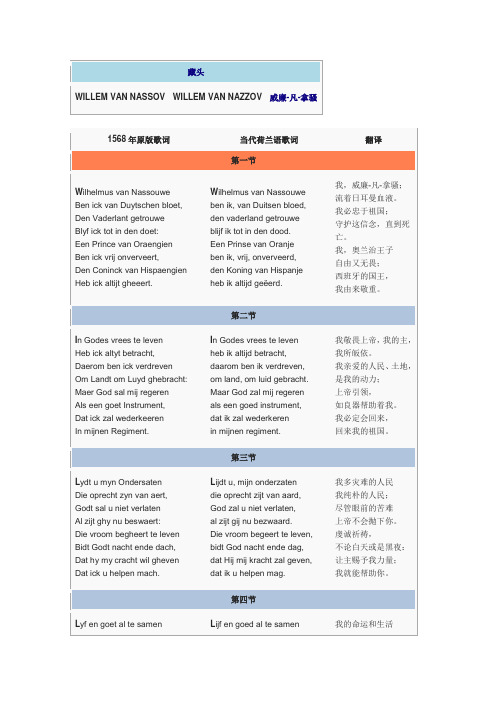
1568年原版歌词当代荷兰语歌词翻译第一节W ilhelmus van Nassouwe Ben ick van Duytschen bloet, Den Vaderlant getrouweBlyf ick tot in den doet:Een Prince van Oraengien Ben ick vrij onverveert,Den Coninck van Hispaengien Heb ick altijt gheeert. W ilhelmus van Nassouweben ik, van Duitsen bloed,den vaderland getrouweblijf ik tot in den dood.Een Prinse van Oranjeben ik, vrij, onverveerd,den Koning van Hispanjeheb ik altijd geëerd.我,威廉-凡-拿骚;流着日耳曼血液。
我必忠于祖国;守护这信念,直到死亡。
我,奥兰治王子自由又无畏;西班牙的国王,我由来敬重。
第二节I n Godes vrees te levenHeb ick altyt betracht, Daerom ben ick verdreven Om Landt om Luyd ghebracht: Maer God sal mij regerenAls een goet Instrument,Dat ick zal wederkeerenIn mijnen Regiment. I n Godes vrees te levenheb ik altijd betracht,daarom ben ik verdreven,om land, om luid gebracht.Maar God zal mij regerenals een goed instrument,dat ik zal wederkerenin mijnen regiment.我敬畏上帝,我的主,我所皈依。
各国国歌
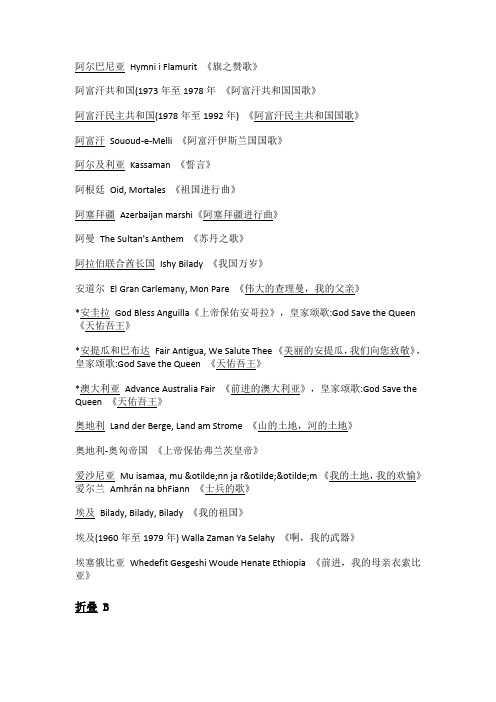
阿尔巴尼亚Hymni i Flamurit 《旗之赞歌》阿富汗共和国(1973年至1978年《阿富汗共和国国歌》阿富汗民主共和国(1978年至1992年) 《阿富汗民主共和国国歌》阿富汗Sououd-e-Melli 《阿富汗伊斯兰国国歌》阿尔及利亚Kassaman 《誓言》阿根廷Oid, Mortales 《祖国进行曲》阿塞拜疆Azerbaijan marshi《阿塞拜疆进行曲》阿曼The Sultan's Anthem 《苏丹之歌》阿拉伯联合酋长国Ishy Bilady 《我国万岁》安道尔El Gran Carlemany, Mon Pare 《伟大的查理曼,我的父亲》*安圭拉God Bless Anguilla《上帝保佑安哥拉》,皇家颂歌:God Save the Queen 《天佑吾王》*安提瓜和巴布达Fair Antigua, We Salute Thee 《美丽的安提瓜,我们向您致敬》,皇家颂歌:God Save the Queen 《天佑吾王》*澳大利亚Advance Australia Fair 《前进的澳大利亚》,皇家颂歌:God Save the Queen 《天佑吾王》奥地利Land der Berge, Land am Strome 《山的土地,河的土地》奥地利-奥匈帝国《上帝保佑弗兰茨皇帝》爱沙尼亚Mu isamaa, mu õnn ja rõõm 《我的土地,我的欢愉》爱尔兰Amhrán na bhFiann 《士兵的歌》埃及Bilady, Bilady, Bilady 《我的祖国》埃及(1960年至1979年) Walla Zaman Ya Selahy 《啊,我的武器》埃塞俄比亚Whedefit Gesgeshi Woude Henate Ethiopia 《前进,我的母亲衣索比亚》折叠 B*巴哈马March On, Bahamaland 《巴哈马,向前进》,皇家颂歌:God Save the Queen 《天佑吾王》巴林Bahrainona 《我们的巴林》*巴巴多斯In Plenty and In Time of Need 《在需要帮助的时刻》,皇家颂歌:God Save the Queen 《天佑吾王》巴基斯坦Pak sarzamin shad bad 《祝福这神圣国土》巴拿马Himno Istmeño 《巴拿马共和国国歌》*巴布亚新几内亚O Arise, All You Sons 《啊,起来,祖国全体儿女》,皇家颂歌:God Save the Queen 《天佑吾王》巴拉圭Paraguayos, República o Muerte!《巴拉圭人,誓死保卫共和!》巴西Hino Nacional Brasileiro 《巴西国歌》白俄罗斯My Belarusy 《我们白俄罗斯人》比利时La Brabançonne 《布拉班人之歌》*伯利兹Land of the Free 《自由的土地》,皇家颂歌:God Save the Queen 《天佑吾王》贝宁L'Aube Nouvelle 《新的黎明》不丹Druk tsendhen 《雷龙王国》玻利维亚Bolivianos, el hado propicio 《玻利维亚人,有利命运》波斯尼亚和黑塞哥维那Intermeco 《连音符》波兰Mazurek Dabrowskiego 《波兰决不灭亡》波多黎各La Borinqueña 《波多黎各国歌》博茨瓦纳Fatshe leno la rona 《保佑这高尚的土地》保加利亚Mila Rodino 《亲爱的父母邦》布基纳法索Une Seule Nuit 《一夜》布隆迪Burundi bwacu 《亲爱的布隆迪》冰岛Lofsöngur 《赞美歌》折叠 C赤道几内亚Caminemos pisando las sendas 《让我们跟随着》朝鲜애국가(Aegukga) 《爱国歌》折叠 D丹麦Der er et Yndigt Land 《有一处好地方》多米尼克Isle of Beauty, Isle of Splendour 《美丽的岛,伟大的岛》多米尼加Quisqueyanos valientes 《伊斯帕尼奥拉岛英勇的子民》多哥Salut à toi, pays de nos aïeux 《多哥共和国国歌》东帝汶Pátria 《祖国》德意志民主共和国Auferstanden aus Ruinen 《从废墟中崛起》德意志联邦共和国Ich hab' mich ergeben《我完全奉献》(1949-1952)Das Lied der Deutschen 《德意志之歌》,第三组歌词(Einigkeit und Recht und Freiheit 统一、法制和自由)大韩帝国(1882年至1910年) 《爱国歌》*大不列颠及北爱尔兰联合王国God Save the Queen 《天佑吾王》折叠 E厄瓜多尔Salve, Oh Patria 《向祖国致敬》厄立特里亚Ertra, Ertra, Ertra 《厄立特里亚,厄立特里亚,厄立特里亚》俄罗斯帝国Bozhe, tsarya khrani 《神佑沙皇》俄罗斯Gimn Rossiyskoy Federatsii 《俄罗斯联邦国歌》(2000 年至今,曲同Gimn Sovetskogo Soyuza 《牢不可破的联盟》),原为Patriotiskaya Pesn 《爱国歌》(1991-2000年)折叠 F斐济God Bless Fiji 《天佑斐济》芬兰Maamme/Vårt land 《祖国》法国La Marseillaise 《马赛曲》佛得角Cântico da Liberdade 《自由之歌》菲律宾Lupang Hinirang 《最爱之地》梵蒂冈Inno e Marcia Pontificale 《教皇进行曲》折叠 G冈比亚For The Gambia Our Homeland 《为冈比亚我们的家园》刚果民主共和国Debout Kongolaise 《起来刚果人》刚果共和国La Congolaise 《刚果人》格鲁吉亚Tavisupleba 《自由》*格林纳达Hail Grenada 《你好格林纳达》,皇家颂歌:God Save the Queen 《天佑吾王》哥伦比亚Oh Gloria inmarcesible 《噢!不褪色的光荣》哥斯达黎加Noble patria, tu hermosa bandera 《庄严的祖国,您美丽的旗》古巴La Bayamesa 《巴雅莫颂》圭亚那Dear Land of Guyana, of Rivers and Plains《最亲爱的圭亚那的山河》折叠 H海地La Dessalinienne 《德萨利纳之歌》洪都拉斯Tu bandera es un lampo de cielo 《你的旗是天国之光》哈萨克斯坦Mening Qazaqstanym 《我的哈萨克》韩国애국가(Aegukga) 《爱国歌》荷兰Wilhelmus van Nassouwe 《威廉·凡·那叟》折叠 J柬埔寨Nokoreach 《四月十日,伟大的胜利》*加拿大O Canada 《哦!加拿大》,皇家颂歌:God Save the Queen《天佑吾王》吉布提《吉布提共和国国歌》捷克共和国Kde domov muj? 《我的家乡在哪里》加蓬La Concorde 《一致》加纳God Bless Our Homeland Ghana 《天佑我们的家园-迦纳》几内亚Liberté 《自由》几内亚比绍Esta é a Nossa Pátrai Bem Amada 《这是我们最爱的国家》基里巴斯Teirake kaini Kiribati 《站起来,基里巴斯》吉尔吉斯斯坦《吉尔吉斯斯坦共和国国歌》津巴布韦Kalibusiswe Ilizwe leZimbabwe 《祝福津巴布韦的大地》折叠 K喀麦隆Chant de Ralliement 《集合歌》肯尼亚Ee Mungu Nguvu Yetu 《造物之神》科威特Al-Nasheed Al-Watani 《科威特国国歌》科摩罗Udzima wa ya Masiwa 《伟大群岛的联合》科特迪瓦L'Abidjanaise 《阿必尚之歌》克罗地亚Lijepa nasa domovino 《我们美丽的家园》卡塔尔As Salam al Amiri《和平的赞歌》*库克群岛God Defend New Zealand 《天佑新西兰》,皇家颂歌:God Save the Queen 《天佑吾王》折叠 L老挝Pheng Xat Lao 《老挝人民歌》拉脱维亚Dievs, Sveti Latviju 《上帝保佑拉脱维亚》黎巴嫩Koullouna Lilouataan Lil Oula Lil Alam 《黎巴嫩共和国国歌》莱索托Lesotho Fatse La Bontata Rona 《莱索托王国国歌》利比里亚All Hail, Liberia, Hail! 《利比里亚国歌》利比亚libya,libya,libya 《利比亚,利比亚,利比亚》列支敦士登Oben am jungen Rhein 《天佑吾王》立陶宛Tautiska Giesme 《立陶宛共和国国歌》卢森堡Ons Hémécht 《我们的祖国》卢旺达Rwanda nziza 《卢旺达颂》罗马尼亚Deşteaptă-te, române! 《觉醒吧,罗马尼亚人》折叠 M马其顿Denes Nad Makedonija《今日马其顿》马达加斯加Ry Tanindraza nay malala ô 《啊,我们亲爱的祖国》马拉维Mlungu salitsani malawi 《上帝保佑马拉维》马来西亚Negara Ku 《我的祖国》马尔代夫Gavmii mi ekuverikan matii tibegen kuriime salaam 《团结一致向我们的国家致敬》马里Pour l'Afrique et pour toi, Mali 《为了非洲为了你,马里》马耳他L-Innu Malti 《马耳他颂》马绍尔群岛Forever Marshall Islands 《永远马绍尔群岛》毛里求斯Motherland 《祖国》墨西哥Himno Nacional Mexicano 《墨西哥国歌》密克罗尼西亚联邦Patriots of Micronesia 《密克罗尼西亚的爱国者》摩尔多瓦Limba Noastra 《母语颂》摩纳哥Hymne Monégasque 《摩纳哥颂》蒙古国Bügd Nairamdakh Mongol 《蒙古国国歌》摩洛哥Hymne Cherifien 《摩洛哥颂》莫桑比克Patria Amada 《最爱的祖国》缅甸Gba Majay Bma 《我们必须热爱缅甸》孟加拉国Amar Sonar Bangla 《金色的孟加拉》秘鲁Somos libres, seámoslo siempre 《我们是自由的,让我们永远保持自由》美利坚合众国The Star-Spangled Banner 《星条旗》折叠 N南苏丹suoth sudan oyee 《南苏丹万岁》纳米比亚Namibia, Land of the Brave 《纳米比亚,勇敢之地》瑙鲁Nauru Bwiema 《瑙鲁,我们的家园》尼泊尔Ras Triya Gaan 《尼泊尔民主联邦共和国国歌》尼加拉瓜Salve a ti, Nicaragua 《向您致敬,尼加拉瓜》尼日尔La Nigerienne 《尼日尔之歌》尼日利亚Arise O Compatriots, Nigeria's Call Obey 《同胞们起来,响应尼日利亚号召》挪威Ja, vi elsker dette landet 《是的,我们热爱这片土地》南非Nkosi Sikelel' iAfrica & Die Stem van Suid Afrika 《天佑非洲》和《南非的呐喊》合编曲纳粹德国(2首国歌) 《霍斯特·威塞尔之歌》《德意志之歌》(整首)南斯拉夫Hej Sloveni 《嗨,斯拉夫人》折叠 P*皮特凯恩群岛God Save The Queen 《天佑吾王》(皇家颂歌)葡萄牙A Portuguesa 《葡萄牙人》葡萄牙王国《立宪颂》折叠 R日本君が代(Kimi Ga Yo) 《君之代》瑞典Du gamla, Du fria 《你古老的光荣的北国山乡》瑞士Schweizerpsalm, cantique suisse 《瑞士诗篇》折叠 S*圣基茨和尼维斯Oh Land of Beauty 《哦美丽的地方》,皇家颂歌:God Save the Queen 《天佑吾王》圣卢西亚Sons and Daughters of St. Lucia 《圣卢西亚的子女》*圣文森特和格林纳丁斯St Vincent Land So Beautiful 《多么美丽的圣文森特》,皇家颂歌:God Save the Queen 《天佑吾王》萨摩亚The Banner of Freedom 《自由旗》圣多美和普林西比Independência total 《完全的独立》沙特阿拉伯Aash Al Maleek 《国王万岁》塞内加尔Pincez Tous vos Koras, Frappez les Balafons 《塞内加尔共和国国歌》塞尔维亚和黑山Hej Sloveni 《嗨,斯拉夫人》塞舌尔Koste Seselwa 《塞舌尔人,团结在一起!》塞拉利昂High We Exalt Thee, Realm of the Free 《塞拉利昂共和国国歌》斯洛伐克Nad Tatrou sa blýska 《塔特拉山上的暴风》斯洛文尼亚Zdravljica 《祝酒歌》*所罗门群岛God Save Our Solomon Islands 《天佑我们所罗门群岛》,皇家颂歌:God Save the Queen 《天佑吾王》索马里Somaliyaay toosoo 《索马里,起来》斯里兰卡Sri Lanka Matha 《顶礼,顶礼,母亲》苏丹Nahnu Djundulla Djundulwatan 《我们是上帝和我们的土地的军队》苏里南God zij met ons Suriname 《苏里南人民之歌》斯威士兰Nkulunkulu Mnikati wetibusiso temaSwati 《斯威士兰王国国歌》塞浦路斯Hymn to Freedom 《自由颂》萨尔瓦多Saludemos la Patria orgullosos 《自豪的向我们祖国致敬》苏维埃社会主义共和国联盟Gimn Sovetskogo Soyuza 《牢不可破的联盟》(1944年以后,1977年5月修改过歌词)The Internationale 《国际歌》(1944年以前)折叠 T塔吉克斯坦Surudi Milli 《国歌》坦桑尼亚Mungu ibariki Afrika 《天佑非洲》泰国Phleng Chat 《泰王国国歌》,皇家颂歌:Phleng Sansoen Phra Barami汤加Koe Fasi Oe Tui Oe Otu Tonga 《汤加王国国歌》特立尼达和多巴哥Forged From The Love of Liberty 《以自由之爱铸成》突尼斯Ala Khallidi, Himat Al Hima 《突尼斯共和国国歌》土耳其Istiklâl Marsi 《独立进行曲》土库曼斯坦Garassyz, Bitarap, Türkmenistanyn Döwlet Gimni 《独立、中立、土库曼斯坦国歌》特克斯和凯科斯群岛God Save the Queen 《天佑吾王》(皇家颂歌)*图瓦卢Tuvalu mo te Atua 《图瓦卢为了上帝》,皇家颂歌:God Save the Queen 《天佑吾王》折叠 W危地马拉Guatemala Feliz 《快乐的危地马拉》乌干达Oh Uganda, Land of Beauty 《啊!乌干达,美丽之地》乌克兰Shche ne vmerla Ukrainy 《乌克兰未死》乌拉圭Orientales, la Patria o la tumba 《乌拉圭人,誓死保卫祖国》乌兹别克斯坦《乌兹别克斯坦共和国国歌》瓦努阿图Yumi, Yumi, Yumi 《我们、我们、我们》委内瑞拉Gloria al bravo pueblo 《勇敢人民的光荣》文莱Allah Peliharakan Sultan 《上帝保佑苏丹》折叠 X希腊Imnos eis tin Eleftherian 《自由颂》匈牙利Isten áldd meg a magyart 《天佑匈牙利人》*新西兰God Defend New Zealand 《天佑新西兰》,皇室颂歌:God Save the Queen 《天佑吾王》新加坡Majulah Singapura 《前进吧,新加坡》西班牙Marcha Real 皇家进行曲叙利亚Homat el Diyar 《家园的卫士》折叠 Y亚美尼亚Mer Hayrenik 《我们的祖国》也门《联合共和国》印度Jana-Gana-Mana 《人民的意志》印度尼西亚Indonesia Raya 《大印度尼西亚》伊朗Sorood-e Melli-e Jomhoori-e Eslami 《伊朗伊斯兰共和国国歌》伊拉克Mawtini《我的祖国》(旧: Ardulfurataini Watan 《两河之地》)*牙买加Jamaica, Land We Love 《牙买加,我们热爱的家园》,皇家颂歌:God Save the Queen 《天佑吾王》约旦As-salam al-malaki al-urdoni 《国王万岁》英治爱尔兰(1949年止)God Save the Queen 《天佑吾王》以色列Hatikvah 《希望曲》意大利Fratelli dItalia 《马梅利之歌》越南Tiến Quân Ca 《进军歌》越南南方共和国Giài phóng mién Nam 《解放南方》折叠 Z赞比亚Stand and Sing of Zambia, Proud and Free 《独立高歌赞比亚,自豪又自由》中非共和国La Renaissance 《复兴》乍得La Tchadienne 《乍得人民》智利Himno Nacional de Chile 《智利国歌》中华人民共和国March of the Volunteers《义勇军进行曲》。
太阳神阿波罗英语介绍

The great god ApolloApllo,who is my idol, is one of the most important and diverse of the Olympian deities in Greek and Roman mythology.He is worshiped in both ancient Greek and Roman religion, and in the modern Greco–Roman Neopaganism.Why?Among the crowd of Olympian gods, the one I like the best was Apollo.He was the son of Zeus and Leto.According to Greek mythology,Leto was driven by Hera from land to land at last. Poseidon took pity on her and brought the island of Delos out of water for her to live on.There she gave birth to the twins ,Apollo and Artemis.Apollo was the sun-god.He wore a purple robe.He usually sat in his bright eastern palace early in the morning and made ready to start his daily journey across the sky.During the day he roved his carriage of gold and ivory ,and brought light,life and love to the great world below.late in the afternoon he came to the end of his journey in the far western sea and got on his golden boat to return to his eastern home.In other words, Apollo symboled for light, hope, diligence. This was the most important reason why I think Apollo is the god most widely admired. The world had a won’t fade of flowers, that was light. It would open as long as there were people place. Light was the world’s most pure, was al so the most warm. Light is always illuminating our future. Let us march forward courageously, will never be destroyed. It is well known that we exist in a world with various difficulties. When we are faced with them, nothing is more important than hope. With hope ,we can find sometimes the question is not as “huge” as we imagine. Without hope, we can not try and exert our strength, and then we will overcome all problems and challenges. If we face the difficulties with hope, then nothing is impossible, brave it out and just do it! Diligence is the key to success. It means persisting in one’s work. It does not mean exerting ourselves all day and all right without rest, food and sleep. The true meaning of diligence is to use time carefully for purpose of improvement , or to work persistently without wasting time. So I think it also is the reason why Apollo’s job is to tell human when is sunrise and sunset. Laziness makes us useless. If we do not study and work hard we shall not be able to earn a living in our community. There will be nothing we can do just because we have failed to learn anything by letting the time pass unused. An English proverb says,’ lost time is never found again’ time is precious and is one of those many things that cannot be purchased with money. Therefore, we make good use of our time and study hard when we are young. Lazy hands make aman poor, while diligent hand s bring wealth.Apollo was the god of music.He could stir up all feelings.These feelings are expressed in lofty songs.This is the reason why I like Apollo.As is known to all, we can drown our sorrow in music when we are unhappy. Music can comfort us and make us happy. So there is much pleasure in listening to music. Besides, music attaches great help to improving our study eff iciency, which is because music is more than just sound. It’s a way of thinking. When we listen to music, we are becoming better thinkers too. Furthermore, it is music that makes us get familiar with colorful cultures and broadens our horizons. In addition, there is no doubt that when we are appreciating English songs, we can develop our English listening skills at the same time., music is a magical thing which can free us from sadness. As the proverb says, music is a special gift.What’s more,Apollo is infatuated with Daphne. Daphne was a lovely fairy.One day when she play in the forest,she found Apollo with admiration in his eyes staring at her.Unluckly,Daphne did not love Apollo.So she crossed the desert and forest woods in order to keeping far way from Apollo.But Apollo love Daphne so much. he begged his beloved maiden to slow down. He is afraid of fairies in the stone road might fall and hurt her sparkling skin.Finally,with Daphne’s father help,Daphne turned into a laurel tree.Apllo heave great sighs to embrace the trunk. To show his undying love for the maiden, he decided that the laurel would be his favorite tree, and decided to use it as a kind of honor and prestige of the awar d, granted it to those eternal poets and poetry.Although Daphne did not love Apllo,Apllo still love her and dedicated all his life to his beloved maiden. I learn much from Apllo’s love.For example,to the world you may be one peron,but to one person you may be the world;Love can overcome everything.Love has no age,no limit and no death and Human nature is so constructed that it gives affection most readily to those who seem least ti demand it,etc.All in all,Apollo represents order,harmony,and civilization in a way that most other Olympian deities cannot quite equal.He is most often associated with the cultivated arts of music and medicine,and his role as the leader of the muses establishes him as a patron of intellectual pursuits.So I love him best.That’s all,thank you.。
英汉哲学术语词典

Aaberrant 背离真理的,离经叛道的;越轨的;异常的;aberrant behavior 异常行为aberration 不合真情的,不合道德标准;像差;精神不健忘;abhorrent to reason 反理性的Abiding 房屋的,固定不变的,持久的abiogenesis (=abiogeny ) 自然发生;自然发生论,无生源说,偶发论abiogenetic 自然发生的;自然发生论的,无生源说的abiogeny 自然发生;自然发生论,偶发论abiotic 无生命的,非生物的abnorm 反常;变态abnormal 反常的;变态的abnormal reaction 异常反常abnormalism, abnormality 变态,变态性;反常的性质和状态;反常的事物abolish 取消,废除(某种制度和法律等)abolishable 可废弃的,可废除的abolition 废弃,取消;黑奴制度的废除aboriginal 最初的,元初的;原始的;原生的aboriginal language 土著语言aboriginal tribes 原始部落abreaction 发泄,宣泄,精神发泄疗法abrogate 废止;废除;扬弃absent-mindedness 心不在焉,神不守舍Absolute, the 绝对的存在;绝对者;(宇宙的)第一原因(first cause);上帝(God) absolute accident 绝对附属性质,绝对附质absolute and relative truths 绝对真理和相对真理absolute a priori 绝对先天的absolute certitude 绝对必然性,绝对确实性absolute cognitive consciousness 绝对的认识意识;纯认知意识absolute completeness 绝对完备,绝对完备性absolute concept 绝对概念absolute consistency 相对相容性,绝对一致性,无矛盾性absolute definition 绝对定义absolute ego (费希特的)绝对自我absolute existence 绝对存在,绝对实存absolute good 绝对善,纯粹善absolute idealism (黑格尔的)绝对唯心论,绝对观念论(旧译),绝对唯心主义absolute idealist 绝对唯心论才,绝对观念论者(旧译),绝对唯心主义者absolute ideas 绝对观念,(黑格尔的)绝对理念absolute mind 绝对精神absolute notion 绝对概念absolute pragmatism 绝对的实用主义absolute reality 绝对本体,绝对实在absolute spirit (黑格尔哲学)绝对精神absolute value 绝对价值absoluteness 绝对,绝对性absoluter Geist [德]绝对精神absolutism 绝对论;专制主义;绝对宿命论absolutist 绝对论者;专制主义者;绝对论的;专制主义的;绝对论者的;专制主义者的;绝对宿命论者,绝对宿命论的abstinence 节制,禁欲abstract 抽象的;理论上的;观念的;(艺术上)抽象派的;抽象;抽象概念,抽象名词 abstract being 抽象存在abstract category 抽象范畴abstract entity 抽象的存在;抽象实体abstract idea 抽象观念abstract ideal theory 抽象观念论abstract proposition 抽象命题abstract reasoning 抽象推理abstract representation 抽象描述,抽象表述abstract thinking 抽象思维abstract thought 抽象思维能力,抽象推理能力abstract unity with itself 抽象的自身统一或同一abstraction 抽象,抽象化,抽象作用absurd 荒谬的,荒诞的,不合理的absurdism 荒诞主义,荒唐性;人生无意义论absurdist 荒诞主义者,荒诞主义哲学的提倡者或信奉者;荒诞主义的,有关(或涉及)荒诞主义的;荒诞剧的absurdity 荒谬;荒谬的事物或性质abuses of language 语言滥用academic 学术的;学院的;学究式的;理论的Academic 柏拉图学派的,学院派哲学的;柏拉图学派的人,学院派哲学家Academician 英国皇家美术院会员;法国美术院会员;苏联科学院院士;学院派哲学家 academicism (=academism) 学院主义,学院哲学的教义,学院式风气;传统主义Academy ,the 柏拉图学园;柏拉图哲学(又称学院派哲学)Academy of Plato 柏拉图学园acatalepsy (古代怀疑论者所谓的)不可知论,不可知性,概然论acataleptic (涉及)不可知论的,(具有)不可知论性质的;不可知论音,概然论者 acceptance 接受;承认;认可accepted 常规的;(被)认可的;公认为真实的access 接近;途径,门路(指手段、方法等)accessible 可接近的;容易理解的,易受影响的accident 偶然性,意外事件accidental 偶然的,偶发的;不具有实质(或内在)性质的,非本质的;附带的;非本质特性,偶然属性accidental event 偶然事件,意外事件accidentalism 偶然论,偶生论;偶然结果;偶发事件accidentality 偶然性,偶有性accommodation 调节;顺应,迁就accountability 有责任,有义务;可解释性,可说明性accumulation 积累achievable 可达到的;可获得的acme, the 顶点,极度acme of perfection, the 十全十美,尽善尽美acon (地质)十亿年,十亿期acosmic 宇宙否定论的,无宇宙论的,否认现世世界是客观存在的acosmism 无宇宙论,无世界论acquaimtance 相识;(从经验中获得的)知识,习知acquired 获得的,习得的;已成习惯的,后天的acquired taste 后天嗜好acquisition 习得;获得;获得物active being 主动的存在active intellect 能动的知性activism 行动论;能动性;能动主义activist 能动论者;能动论者的,有关或涉及能动论者的;能动论的,有关或涉及能动论的 activity 活动,活动性actual value 内在价值actuality 现实性;现实adage 格言,谚语Adam (《圣经》)亚当;最初的人Adaptation 适应,顺应addition 加,加法adequate 充分的,合适的adjoint 伴随的;伴随adjudication 判决aesthetic(=esthetic) 美学;美学的,审美的;感性的aesthetic sense 美感,美意识aesthetic sentiment 美的情操aesthetician 美学家,审美学家,审美学者aestheticist 美学家;审美学家aesthetics 美学;(康德哲学)感性论aetiological 原因论的aetiology 原因论affection 情感,爱;影响,作用affiliation 亲密关系affinity 亲和力;姻亲关系;关系密切;构造(或结构)近似after-effect 后效应;副作用afterimage 残像,余像afterthought 回想;追悔age 年龄;时代;时期;年代agent 行动者;原因;动因;作用物agent intellect 起动因作用的理智agent of the world-spirit 世界精神的代理人aggregate 使聚集;聚合的;集合aggregation 聚集作用,集合体;(生态)集合生活aggressiveness 攻击性,侵略性agitation 不安,激动agnostic 不可知论的;不可知论者的;不可知论者agnostical realism 不可知论的实在论agnosticism 不可知论agnosticist 不可知论者alchemist 炼丹术士的,炼金术的aleatory 侥幸的,碰运气的alien 相异的,异己的alienate 疏远,异化alienated labor 异化劳动alienation 异化alienism 精神病学alienist 精神病学家alignment (政治上的)结盟;合作;(系统内的)调整allegiance 忠顺,忠诚;虔诚allegory 比喻;寓言,寓意Allfather 神,上帝all-nature 整个自然界allocution 训谕almightiness 全能,万能almighty 全能的,万能的Almighty God, the(=God Almighty=the Almighty) 全能之神,上帝 alternative 二者择一的;选代的;互斥性;选代alternative case 可供选择的情况,可供选择的事例altruism 利他主义(A.孔德用语)altruist 利他主义者,信奉利他主义的人altruistic 利他的,利他主义的amalgamation (社会、思想等)同化,融合amalgamation of thought and action 思想与行动的一致ambiguity 含糊,模棱两可的语意;双重意义(double meaning) ambiguous 有歧义的,语议含混的,模棱两可的ambit 界限;范围ambitendency 自我矛盾倾向ambition 野心;功名心;宏愿的目标ambivalence (对同一人、事、物的)矛盾心理;双重性amelioration改善,改良ament 低能者,智力欠缺的人;白痴Americanologist 美国问题专家amorphism 虚无主义;无定形现象,无定形amphibol(o)gy(o)gy 模棱两可的言词;意义含糊amphibolous 含糊的,模棱两可的anabolism 同化作用,同化,物质合成代谢Analects of Confucius 《伦语》analogic(al) 类推的,类比的;根据类似的analogous 类似的,相似的analysis and synthesis 分析与综合analytic and synthetic propositions 分析命题和综合命题analytic geometry 解析几何analytic judgment a priori 先天分析判断analytic Marxism 分析的马克思主义analytic Marxist 分析的马克思主义者analytic philosophy 分析哲学,哲学分析(philosophical analysis) analytic philosophy of language 语言分析哲学anarchism 无政府主义;无政府状态,无政府anarchistic(al) 无政府主义的,关于(或倾向于)无政府主义的 Anaximandrian 阿那克西曼德哲学的ancient Greek views of nature 古希腊的自然观ancient materialism 古代唯物主义ancient of Days, the 上帝,神ancient philosophy 古代哲学ancients, the 古代文明的人民(尤指古希腊罗马人)angelology 天使说animal soul 动物的灵魂animal spirits 生命精气;元气(liveli-ness);元精anmal worship 动物崇拜animatism 物活论animatist 物活论者animism 泛灵论,万物有灵论animist 泛灵论者,万物有灵论者animistic materialism 泛灵论唯物主义animistic materialist 泛灵论唯物主义者annals 年鉴,编年史annihilation 灵魂与肉体的毁灭annotated 附注释的,有注释的annotation 注释Anointed, the 救世主,基督anomaly 不规则,反常现象,异常anomy(=anomie) (社会)反常状态,混乱;无法无天行为;无律anonymous 匿名的,无名的,假名的Anselm’s ontological argument of the existence of God 安塞姆关于上帝存在的本体论论证 antagonism 敌对,对立;对抗性,对抗作用antagonistic(al) 对抗性的,敌对的,不相容的anteriority 先前,原先anthem 赞美诗,赞歌anthology 选集anthropic 人类的,与人类有关的anthropism(=anthropocentrism) 人类中心主义,人类中心说,人类本位观anthropocentric 以人类为宇宙中心的;人类中心主义的;以人类标准观察和解释宇宙万物的 anthropologism 人本主义anthropologist 人类学家;人本主义者anthropology 人类学;文化人类学,哲学人类学anthropomorphic 神人同形或同性论的anthropomorphism 拟人说,神人同形或同性论;拟人化anthropomorphist 神人同形或同性论者anthropomorphous 有人形的,似人的anthropophuism 神人同形或同性论anticipation 预想;预期;期待antinomy 二律背反,(法律、原则、法则的)矛盾;悖论antinomy of liar 说谎者悖论antitheism 反有神论,无神论antitheist 反有神论者,无神论者antithesis 对立;对立面;反题antithetic(al)正相反的,对立的apathy 无动于衷,冷淡,情感淡漠apeman 猿人apex 顶点,顶峰aphorism 格言,警句Apocalypse, the 《圣经》中的《启示录》apodeictic (=apodictic) 表达必然真理的;必然的;可以明确表示或证明的;绝对肯定的apologetics (基督教的)辩证学,护教学,辩证论apologist 辩护士,辩护者,护教论者apology 辩护,辩解aporetic 怀疑的a posteriori [拉]后天的;归纳的;后天地,归纳地Apostle (基督教)十二使徒之一。
英语单词最实用常见的词根、词缀大全

archenemy archeological architect anarchy arctic coward arduous arena argentine argument librarian hilarious aristocracy aristocracy arithmetic similarity vivarium armament aroma arson artist artery arterial
apart aperture aphonia apiary apical apology periapsis adapt aquatic aquatic aquiline pedlar arbiter arbitrage arboriculture arcade anarchism archaism archaeology
简明哲学术语英语词典
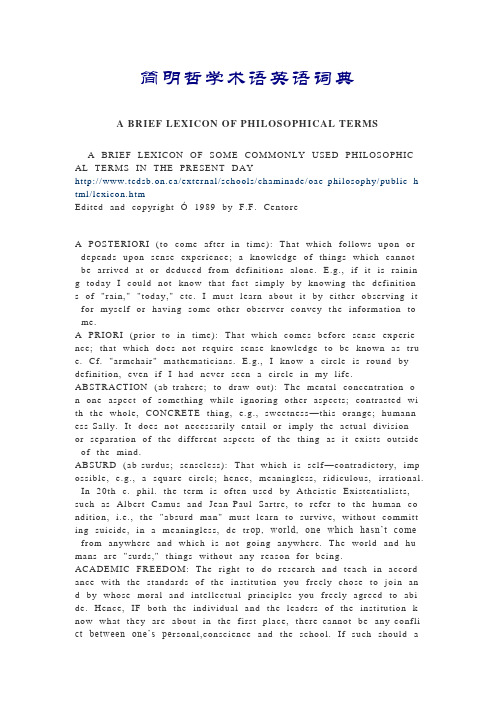
简明哲学术语英语词典A BRIEF LEXICON OF PHILOSOPHICAL TERMSA BRIEF LEXICON OF SOME COMMONLY USED PHILOSOPHIC AL TERMS IN THE PRESENT DAYhttp://www.tcdsb.on.ca/external/schools/chaminade/oac-philosophy/public_h tml/lexicon.htmEdited and copyright Ó 1989 by F.F. CentoreA POSTERIORI (to come after in time): That which follows upon or depends upon sense experience; a knowledge of things which cannot be arrived at or deduced from definitions alone. E.g., if it is rainin g today I could not know that fact simply by knowing the definition s of "rain," "today," etc. I must learn about it by either observing it for myself or having some other observer convey t he information to me.A PRIORI (prior to in time): That which comes before sense experie nce; that which does not require sense knowledge to be known as tru e. Cf. "armchair" mathematicians. E.g., I know a circle is round by definition, even if I had never seen a circle in my life. ABSTRACTION (ab-trahere; to draw out): The mental concentration o n one aspect of something while ignoring other aspects; contrasted wi th the whole, CONCRETE thing, e.g., sweetness—this orange; humann ess-Sally. It does not necessarily entail or imply the actual divisionor separation of the different aspects of the thing as it exists outside of the mind.ABSURD (ab-surdus; senseless): That which is self—contradictory, imp ossible, e.g., a square circle; hence, meaningless, ridiculous,irrational. In 20th c. phil. the term is often used by Atheistic Existentialists, such as Albert Camus and Jean-Paul Sartre, to refer to the human co ndition, i.e., the "absurd man" must learn to survive, without committ ing suicide, in a meaningless, de tr op, world, one which hasn’t come from anywhere and which is not going anywhere. The world and hu mans are "surds," things without any reason for being.ACADEMIC FREEDOM: The right to do research and teach in accord ance with the standards of the institution you freely chose to join an d by whose moral and intellectual principles you freely agreed to abi de. Hence, IF both the individual and the leaders of the institution k now what they are about in the first place, there-cannot be any-confli ct between one’s pe rsonal,conscience and the school. If such should arise due to a change on the part of the teacher, in good conscience the teacher should voluntarily leave.AD HOMINEM (against the person): In logic, a pseudo—argument dir ected against some personal characteristic of the opponent rather than against the substance of the position. E.g., Einstein couldn’t have be en right; just look at the way he combed his hair!AESTHETICS (aisthanesthai; to perceiveby the senses): Theories conce rning the nature, origins, and appreciation of the beautiful. AGNOSTICISM (a—gnostos; unknown): In Latin, ignorance. Claiming t hat nothing is known concerning the answers to the ultimate question s of science, phil., theology, and life in general. Such knowledge is lacking now, but we may get it in the future. E.g., Darwin claimed t hat he didn’t have any certain knowledge about the existence of God and human freedom.ALIENATION (alius; other): In general, the withdrawing or removing of one thing from another; to be left out; estranged. In 19th c. phil., the "For—Itself" losing itself to the "In—Itself," which then comes t o stand over in opposition against the "For—Itself." In Hegel, The A bsolute Spirit (God) becoming other in the form of the Material worl d which is determined and mechanisti c in accordance with the Newto nian laws of nature. In Marx, the workers losing their profits to the capitalists; their labor, which is the source of all wealth, is alienate d from themselves. In Ludwig Feuerbach and Sigmund Freud, the proj ection of human father—figure traits into the heavens so as to produ ce God; the losing of human nature, which is real, to divine nature, which is unreal but which nevertheless, as an obsessional neurosis, st ands in opposition to man. In Sartre, the human condition of the ab s olute, autonomous, free will (the For—Itself, non-being, nothingness) i n opposition to the oppressive, inert world of physical matter (the In —Itself, being); inexplicably the In-Itself produces the For—Itself; bei ng recoils against itself to produce the n othingness of human conscio usness; it’s me (my consciousness) against the world (including other people).ALTRUISM (alter; the other): Showing an unselfish love for others. ANALOGOUS USAGE: In general, the same term has a meaning that’s partially the same and partially different in different contexts; very common in ordinary language. E.g., tall man, ta;; tree; good flatwor m, good husband; true diamond, true friend, true love; beautiful flow er, beautiful building, beautiful person, etc.ANALOGY (ana—logos; to say again): A ratio of one thing to anothe r; a comparison; usually meaning that two things are the same in at least one respect even though there may be differences in other respe cts. Main types: ATTRIBUTION: The trait belongs to only one of the things being compared but is attributed by the mind to something else, e.g., only a whole organism is really healthy but we can also cal l vitamin C healthy because of its relationship to health in the body. GENUS, INEQUALITY: Both a man and a dog are animals; "an imal" is the genus to which they both belong; we can compare them by p ointing out this sameness. However, although they are equally animals they are not equal animals, i.e., man is superior to dog. IMPROPER PROPORTIONALITY: Literary devices and comparisons; "Pretty as a picture;" "The sunset was a great pool of blood lying on the horizo n;" "My love is like a red, red rose...;" etc. This sort is very import ant in rhetoric, poetry, persuasive speech, etc., and can add a great deal of enjoyment to our lives, but is not so useful in science, phil., and theology. PROPER PROPORTIONALITY:The most important in phil. Here there is a strict proportion of prop ortions; the individual terms of one proportion are not proportionate t o the individual terms of the other pro portion, but the whole proporti on between the terms on one side is proportionate to the whole prop ortion between the terms on the other side of the relationship. E.g., 3/6 = 5/10; the good for a flatworm is to the nature of a flatworm as the good for a human is to the nature of a human; knowledge in God is to the essence of God as knowledge in an angel is to the e ssence of an angel as knowledge in a human is to the essence of a human. 3 and 5 are different numbers; goodness and knowledge are d ifferent in each of the cases mentioned. Yet, even though the numera tors and denominators are not the same, the proportion holds. What t he sets have in common is the same relationship within each of the respective proportions. This is very important when it comes to rea so ning by analogy in phil., especially in the Phil. of Being.ANALYTIC STATEMENT: (see A Priori).ANGST (die Angst——German; mir 1st angst-—I am afraid; anxiety, a nguish): Term popularized by Heidegger; the human condition when A theistic Existentialism takes hold and we become fully aware of the meaninglessness of life. Also known as Existential or Objectless Anxi ety; state of being forlorn, lost; aimless; bored. ANTHROPOMORPHISM (anthropos-morphos; human-shaped): Having hu man traits; attributing human traits to non—humans, such as to anima ls or to the gods.APPEARANCE (ad-parere; to come forward and show yourself): That which shows itself in any way, either to the senses or to the mind. Cf. PHENOMENON (phainein; to show).ARGUMENT (argos; white; arguere; to clarify): Words arranged in su ch a way so as to persuade somebody of something; a proof; to mak e clear by "spelling it out;" a reasoning process which goes from the truth of some given statements to the truth of some other statement (s). Either Deductive or Inductive.ASSUMPTION (assumere; to take up): Something taken for granted wi thout proof.ATHEISM (a-theos; godless): A denial of God’s existence; usually me aning the denial of the Judaeo—Christian God of the Bible.ATOM (a-tomos; indivisible): The smallest possible unit of material r eality. Atomism as a phil. of all reality was first developed by the a ncient Greeks.ATTACKING A STRAW MAN: In logic, a faulty argument which mis ses the main point of something and instead of directing its rebuttal against the opponent’s true point sets up a false point (a straw man) which it then proceeds to attack as if it were the true point. E.g., the traditional religious position on human nature and freedom is that we are free but that we also have a nature (essence) which sets li mits to what we are capable of doing freely (e.g., we are not free t o fly by flapping our arms). Someone such as Sartre, though, claims that having a positive essence necessarily determines all of our action s so that we are not free at all. But thi s is to sidestep the original position which was to be argued against.AUTHENTICITY (authentikos; one who acts boldly, the master): In 2 0th c. phil., doing what, you want to do without making any excuses or giving any reasons; to be true to yourself by act ing in oppositio n to others. Cf. Jean—Paul Sartre: "Hell is other people." Cf. his Be ing and Nothingness, III, 3, iii: "The essence of the relations betwee n consciousnesses is not the Mitsein; it is conflict."AUTHORITY (auctor; originator): The right to d irect and rule; a mor al power, not based on physical force, although force must often be used in practice. Presupposes the freedom of those commanded; only free beings can responsibly respond to an order. E.g., the difference between the government orderin g the rain not to fall and ordering cit izens to pay taxes.AUTONOMOUS (auto—nomos; self-law): In 20th c. phil., being a law unto yourself; disregarding the needs of others if you want to and not feeling guilty about it; acting without any external guidelin es, rul es, objective measures of what’s good and bad or right and wrong. " Doing your own thing."AXIOM (axios; worthy): Something obvious enough to be taken for g ranted."BAD FAITH": In 20th c. phil., acting in a non-authentic and non-au tonomous way.BECOMING (becuman-—Old English): Any motion or change; any pro cess of passing from potency to act; any condition of being different from what something was before.BEGGING THE QUESTION: Assuming the truth of the thing to be pr oven; circular argument. E.g., you can tell the age of the rock stratafrom the fossils and we know the fossilsare of a certain age because of the rock strata in which they are fo und; This is an IQ test. Yes but what is IQ? It is what the IQ test tests for. Sometimes it is called a vicious circle (vitium; corrupt, vi ce) because of its faultiness.BEHAVIORISM: In the 20th c., philosophical Reductionism applied to the study of humans. Developed by J.B. Watson and B.F. Skinner; a dopted by A.J. Ayer.BEING (esse; to be): That which is in any wa y whatsoever, whether in or out of the wind, whether actual or possible. A BEING: That w hich is in existence here and now in any way whatsoever.BEING-FOR-ITSELF: Terminology derived from Hegel. In Sartre (être-pour-soi), the nihilation of being within eac h human being; the basis for consciousness of the world and self—consciousness; that which sta nds out in opposition to being even though it is itself a creation of being; human nature.BEING-IN—ITSELF: Terminology derived from Hegel. In Sartre (être-en-soi), the non-conscious, inert, dead, inexplicable, physical nature w orld of being; the full world; the world without the admixture of not hingness; the world that simply is; what we will become at death. BEING OF REASON: In Latin: ens rationis; plural: entia rationis. So mething which cannot exist outside the mind; it can have only mental existence; a logical being; a mental construct, but which nevertheles s has a foundation in extramental reality. E.g., negations and privatio ns——talking about something which i sn’t there; logical devices to de al with things as thought——abstractions, subjects and predicates in p ropositions, genera and species, etc. It does not refer to simply imagi native entities, e.g., a flying horse, or the numerous Hollywood creati ons. (see Intention)CATEGORY (kata—agora; by the town square where people congregat e): A more definite arrangement of things; a narrowing down of some thing broad and open; a classification; putting something into a class, group, set, type, sort, etc., as set of f fro m other groups, classes, e tc.CATHOLIC (kata-holos; •in with the whole): That which is universal and all—encompassing. Most usually used in The Roman Catholic Chu rch: A universal religious organization with its HQ in Rome whose o bligation it is to convey the message of Christ to all parts of the w orld until the end of time.CAUSE (causa): That upon which something else is dependent for its existence; that which in any way influences the being or becoming of something; the reason for the exisence of somethin g; the principle from which something flows. Aristotle’s four main types of causes: MATERIAL: That out of which something is made; that which is inpotency to become something else, e.g., the wood used in making a chair. AGENT orEFFICIENT: The real thing that works on the material to wake the t hing, e.g., the carpenter. The agent cause must be a really existing t hing; a possible carpenter cannot make anything. FORMAL: The form or nature of the thing made, e.g., it’s a chair rather than a table, e tc. In this case it is an artifact, and so the form is accidental to th e material. In the case of a natural entity, such as a human being o r an oak tree, the form would be essential. FINAL: The purpose, end, goal, or reason why the thing is made. In the case of a na tural thi ng, the Formal Cause, once in existence, acts as an Agent Cause to produce the Final product, e.g., an acorn growing into an oak tree. T hus Aristotle can treat the last three causes as one cause in natural operations. Beware of pseudo—causes. Time, for instance, is not a ca use of anything; it cannot heal any wounds or bring about the creati on of a new species. How did you get from New York to Toronto? It took a long time. HOW did man develop from the apes? It took a long time.CENSORSHIP (censere; to tax or assess costs): In common usage, al ways bad and incompatible with a free society; the unjustified suppre ssion of public expression. But this should not be confused with the justified regulation of the popular media. E.g., the control of informa tion in time of war; the suppression of hate literature or material de grading or exploiting people, such as pornography; the control of mat erial inciting riots, violence, and sedition; copyright laws preventing one person from stealing the work of another; l aws forbidding the tel ling of lies about people in public, etc. Also, in any decent society self-censorship is necessary.CERTITUDE (certus; cernere; to sift out, to discern): The state of be ing certain and settled in one’s view; a firm assent to an intell igible statement without any fear of error. To be really firm and complete (scientific) it must include a knowledge of the reasons why things a re the way they are and could not be otherwise. Main types: METAPHYSICAL, MATHEMATICAL, ABSOLUTE: There is no pos sibi lity of error, e.g., 2 plus 2 is 4, a physical whole is always greater than any one of its parts or subdivisions, the diameter of a given c ircle is always shorter than its circumference, a world of physical thi ngs exists independently of the individual’s own mind, etc. PHYSICA L: The ordinary and usual laws of nature, e.g., the laws of chemical interaction, motion, thermodynamics, aerodynamics, etc. Barring mirac les, we can bet our lives on these certitudes-—and do! MORAL, JUR IDICAL: Beyond reasonable doubt; the ordinary kind in most societal interactions; all the evidence, from many different independent sourc es, all points to the same conclusion. E.g., when taking a bus downtown, it would be unreasonable to run up and down the aisle shouting that the bus was being captured by Martians. The denial of Moral Certitude is the most- usual basis for Hollywood spy movies, science fiction plots, adventure series, etc. The suspension of ordinary huma n expectations (i.e., being neurotic) greatly helps one’s career as a n ovelist and screenwriter. (see Realism)COMMON SENSE: In general, knowing those things which are require d in order to survive in a given society. This will vary from society to society in different parts of the world. E.g., those living in the Arctic need to know about 14 different kinds of snow; those living i n London need to know not to run out into the street from between parked cars, etc. In phil., it refers to those truths known with certain ty by all normal human beings, regardless of where they live. E.g., b asic mathematics, the existence of the external world, that there’s a difference between existential questions (Is it?) and essentialistic ques tions (What is it?), that water runs down hill, that what goes up (a rock, an arrow, a spear, etc.) comes down, etc. These certitudes can then be used as a basis for further philosophical and scientific reason ing.COMMUNISM: A 19th c. utopian political phil. based upon Hegel’s d octrine of conflicting contradictories, but reduced to a two—part disju nction in which one side is all bad and the other side all good. In t heory, the 19th c. capitalists would concentrate more and more power in themselves while the working class would become larger and larg er and poorer and poorer. Finally a flash—point would be reached, re volution would break out, all capitalists would be destroyed, and the society, after a brief bloody and violent transition period, would be t ransformed into a new classless, stateless, godless Paradise on earth f or all future generations. Abhors (in theory) God—Statism (Fascism, Nazism).CONCEPT (concipere; to conceive in the womb): Something born with in the mind; an IDEA, a "universal," that about which we invent lan guages, etc. Every idea we have is a universal in the sense that its content or meaning is something common to many different things in the world. E.g., the word "dog" in English stands for the concept o f dogness, which applies to all possible dogs, whether past, present, or future. No concept can be identified with anything of a mate rial o r physical nature, such as the word "dog," or some particular picture or graphic image of a particular dog, etc. Since —~ philosophers w ork with ideas, and since ideas are so special, they have always been of special interest to philosophers.CONCLUSION (com—claudere; to close in): In logic, the end of a re asoning process; the final outcome of an argument. E.g., given that a ll people are mortal and that Sally is a person we conclude that Sally is mortal.CONSERVATIVE (conservare; to preserve): In gene ral, anyone who w ants to maintain the status quo without any fundamental change or al teration. "Today’s liberals are tomorrow’ s conservatives." CONTINGENT (com—tangere; to touch upon): That which need not b e the case; something which could be otherwise; t he accidental; somet hing which just happens to be the case.CONTRADICTION (contra—dicere; to speak against): In logic, the rel ationship between a universal proposition and a particular proposition differing in quality. E.g., All people are mortal——Some people are n ot mortal; No people are mortal-—Some people are mortal. In general, any statement which denies a given statement in an immediate and direct way.COSMOLOGY (kosmos-logos; explaining the cosmos): The General Sci ence of Nature; the attempt to explai n the natural universe of changi ng things in some general and comprehensive way. Common topics: S ubstance, change, chance, teleology, time. Cf. cosmonauts, cosmetics. Today the word is often used to mean astronomy.CREATION EX NIHILO (creare; to make more): To create from nothi ng; creation strictly and properly speaking; possible only for a Supre me Being whose very essence is to exist.DASEIN (there-being in German): Term for human nature derived fro m Hegel and popularized by Heidegger. Humans are the locus, mediu m, site, etc., wherein Being becomes aware of itself. Only in humans is Being there; otherwise it would be completely unknown and even "non—existent."DEDUCTION (de—ducere; to lead away from): In logic, the processof starting from something more universal and coming down to somet hing more particular; common in a priori reasoning; a desirable and s trong form of reasoning because if the premises are true we can be sure that the conclusion will be true. E.g., all circles are round, this thing is a circle, and so this thing is round.DEISM (deus; god): The doctrine that there indeed exists a God who created the universe and who punishes sinners, but in a highly "rati onalized" sense; after setting things up God abandoned the world and us to the laws of nature; an absentee landlord; there is no Revelati on nor authoritative Scripture and Church. Some famous deists: Many of the leaders of the American and French Revolutions; Voltaire, Ro usseau, Hugo, maybe Darwin.DETERMINISM (de—terminare; to set limits to): The doctrine that ev erything that happens, including apparently free decisions by humans, is really already decided by previous, unconscious, unfree events whic h cause things to go one way rather than some other way regardless of what we think about it; fatalism; a perfect knowledge of the causes would provide us with perfect predictability (the dream of scienc e). Some famous determjnists: Darwin, Freud, Einstein, Bertrand Russe ll, B.F. Skinner, A.J. Ayer.DIALECTIC (dia-legesthai; to converse): In Plato, phil. itself; the epit ome of reasoning; the process of trying to reach a conclusion by exa mining all possibilities until the right one is found. In phil. since th e early 19th c., a collision of contradictories producing some third th ing which synthesizes them and then becomes itself a part of another conflict. In Georg Regel and Karl Marx, the fusion of Something an d Nothing to give Becoming; in Fascism, the conflict of capitalists a nd workers to give the State.DIALECTICAL MATERIALISM: The theoretical foun dation for the Co mmunism of Marx and Engels; the doctrine that the only reality is th e material universe, but that it necessarily progresses in a dialectical way, the results of which are various stages of development, i.e., n on—life to life to animals to man to society to various economic sys tems to socialisms to Communism; a "scientific" dialectic, in contrast to Hegel’s mystical spiritualistic process.DISTINCTION (stigma; mark; dis—stinguere; different marks): The no n—identity of one thing with another.Main types: SEPARATION: The physical arrangement of parts outside of parts, e.g., your pen is sep arate from your hand. VERBAL; Different names for one and the sam e thing, e.g., methanol, methyl alcohol, methyl hydrate, denatured alc ohol, wood alcohol. LOGICAL, MENTAL, CONCEPTUAL, RATIONAL: The difference is only in the mind; outside the mind there is in fa ct no real differentiation, e.g., cat—mammal, dime—coin; in the extra mental world every case of cat is also a case of mammal, every dim e is a coin; in reality the two are the same; they are identical. REA L: Even though there is no separation of parts, outside the mind one aspect is really not the other; in one and the same unified being th ere is a non-identity of aspects, features, etc., e.g., your height and weight, the direction and velocity of a body in locomotion, the essen ce and existence of a being. Distinction should not be identified with separation; although every separation is a distinction it is not the c ase that every distinction is a separation. This is very important in t he Phil. of Being.DUALISM (dualis, duo; two): Most usually in phil. the view that the body and soul (psyche, mind, consciousness, etc.) cannot be reduced one to the other; i.e., both are factors in the explanation of human nature which possess some sort of reality of their own. Main types: MODERATE: In’ Aristotle, the body and soul constitute a unity of one being in which the soul is the form of the substance; they can be distinguished but not separated. Variations are possible, e.g., Thom ism, in which the body and soul form a unity based upon the existential act of the soul, so that it’s possible for the soul to survive the breakdown of its body. EXTREME: In Plato and Descartes, the body and soul are two separate entities which do not form a unity; the s oul is the real person; the body is simply a machine. EGALITARIANISM (egalitaire; equality): An absolute equality of ever yone in everything; the Prime Minister would have exactly the same rights, privileges, standard of living, e tc., as the lowest street cleaner; males and females must be treated in exactly the same way, whethe r it’s fighting in the army or having babies; a doctrine proposed by some modern revolutionaries and feminists; but quite impossible in pr actice.EMPIRICISM (en—peiran; to try something for yourself): The doctrine that all knowledge must come through the senses; there are no INN ATE IDEAS born within us that only require to be remembered. It is often carried to the extreme of saying that our concepts are only se nse images or only the words we use to refer to things.ENTITY (ens; being): Anything that exists, usually meaning as a natu ral unified substance.EPICUREANISM: An ancient Greek school of phil. founded by the At henian Epicurus. Based upon a materialistic atomism, it taught that p hysical pleasures, adjusted to what can be reasonably expected in a p articular time and place, constitute man’s greatest good and happiness. One must live unknown, avoid pain and trouble, and calculate the p leasure and pain to be derived from a given activity, including interp ersonal relations; produces a very conservative attitude because "rocki ng the boat" is sure to get you into trouble with the police. "Eat, dr ink, and be merry for tomorrow you die" is really a distortion of th i s phil. The phil. of life actually practiced by most people in the wo rld. Defended by the Roman Lucretius about the time of Christ. EPISTEMOLOGY (episteme-logos; true and certain knowledge explaine d): The study of human knowledge; its origins, types, and dependabili ty.EQUALITY (aequus; on the same level): Everyone having the same b asic worth and dignity before God, the law, and among other people; the same opportunities for success and advancement, though equality of results is not guaranteed. It does not mean that anyone can do a nything anyone else can do, e.g., becoming a priest.EQUIVOCATION (aequi—vox; with equal voice): Using the same term with entirely different meanings. E.g., a river bank, a bank for mon ey; Fido and Kierkegaard are both Great Danes. Often the basis for puns and jokes.ESSENCE (essentia; beingness, reality): Answers to the question, Wha t is it? The definition of something. The NATURE as known. E.g., F ido and Rex are Great Danes; Sally and Sam are human beings.ETHICS (ethos; habits): The ultimate practical knowledge; how to lea d the good life in the good society; the norms of proper behavior fo r humans as humans, not as doing some particular Job, e.g., Street cl eaning, computer programming, being the president of GM, being the Pope, etc. Ethics presupposes freedom on the part of the beings capa ble of acting ethically, e.g., humans. Things such as animals, plants, and minerals, which are not free in the sense of having the potential for free -choice, are not held responsible for their a ctions in any m oral sense. Main subdivisions, following the six main institutions of a ll human soèieties: Phil. of Religion and Government (Political Phil.), Family, Education, Work, Recreation.ETIOLOGY (aitia; cause): The study of the causes and origins of thi ngs.EUDAEMONISM (eu-daimon; good demon or spirit): Living well; bein g attended by good fortune. In Aristotle, happiness as the ultimate re sult of a good life.EVIDENCE (e-videre; clearly seen): The reasons for holding a certain view; the indicators of truth.EVIL (yfel--Old English): The privation of something that a being sh ould have or is due to it; the deviation from an ideal. E.g., with res pect to humans, not having wings is not an evil. PHYSICAL EVIL: Starvation, blindness, being crippled; MORAL EVIL: Sin, turning awa y from God; SOCIAL EVIL: Being deprived of just treatment, not be ing able to receive a liberal education. Any talk of evil presupposes the existence of objective standards or ideals.EVOLUTION (e-volvere; to unroll): Originally, the unrolling or unfold ing of Divine Providence, which is why Charles Darwin avoided usin g the term. DARWINIAN EVOLUTION: The creation of new species by common descent with modification via natural selection. He could not reconcile evil and Providence and so sought to explain species w ithout their being specially created by God. Starting from one very si mple living thing each new individual would vary somewhat from all others. Those better able to survive in their given environments wou ld go on to reproduce in larger numbers than the others (differential reproduction). In time, different looking, more complicated things wou ld be seen, while many others died out. He was a firm believer in t he overall progress and advancement of the biosphere. This has led t o the widespread present—day attitude that anything novel is automati cally better and superior to anything old; the common saying, "You’r e history," indicates that you are no longer of any importance or sig nificance. Today, in common speech, evolution usually m eans simply a slow change, as opposed to a fast change (revolution). EXISTENTIALISM (ex—sistere; to stand outside of its cause or sourc e): In 20th c. phil., mainly the view of Sartre, emphasizing the Deat。
“God”翻译成“上帝”的历史演变及文化内涵

“God”翻译成“上帝”的历史演变及文化内涵“God”一词在英语中被翻译为“上帝”,是基督教信仰中最重要的概念之一。
这一概念不仅在基督教中具有重要地位,也在其他宗教和文化中有着不同的内涵。
在这篇文章中,我们将探讨“God”这一词的历史演变及其在不同文化中的内涵。
“God”一词最早可以追溯到古英语中的“god”,它与德语中的“Gott”和荷兰语中的“god”有着相似的词源。
在古英语中,“god”一词是指“神灵”或“有能力的神”,在宗教中用来指代各种神灵。
随着基督教在欧洲的传播,这一词汇逐渐与唯一的全能神联系在一起,成为基督教中的上帝。
在基督教中,“上帝”通常被认为是全能的、无所不能的创造者,他是世界的主宰和救赎者。
在圣经中,“上帝”被描述为三位一体的存在,即父、子、圣灵三位合一。
这一概念在基督教神学中占据了核心地位,影响着基督教徒的信仰与生活方式。
除了在基督教中,“上帝”这一概念在其他宗教和文化中也有着不同的内涵。
在犹太教中,“上帝”被称为雅威(Yahweh),是创世者和世界的主宰。
在伊斯兰教中,“上帝”被称为阿拉(Allah),是唯一真主,穆斯林信众的唯一崇拜对象。
在印度教中,“上帝”有许多形象和化身,被崇拜和祈祷的对象眾多。
在佛教中,“上帝”并不占据核心地位,佛教徒更注重觉悟和解脱。
在西方文化中,“上帝”这一概念不仅局限于宗教信仰,还扩展到了哲学、文学、艺术等领域。
在中世纪的欧洲,“上帝”被认为是世界的中心和统治者,宗教教义影响了欧洲的政治和文化生活。
在文艺复兴时期,“上帝”这一概念受到了挑战和重新审视,人们开始更加注重人文主义和自然之美。
在现代的西方社会,“上帝”这一概念在一定程度上被宗教信仰所边缘化,但仍然在文化和价值观念中扮演着重要的角色。
在东方文化中,“上帝”这一概念也有着不同的内涵。
在中国传统文化中,并没有一个统一的“上帝”概念,而是多神信仰和自然崇拜。
在日本的神道教中,“神”被崇拜为自然和宇宙的化身,被认为存在于万物之中。
节日古尔邦节作文600字

节日古尔邦节作文600字英文回答:Eid al-Adha, also known as the Festival of Sacrifice, is a major Islamic holiday that commemorates thewillingness of the Prophet Ibrahim (Abraham) to sacrifice his son Ismail (Ishmael) as an act of obedience to God. The holiday is celebrated annually on the 10th day of Dhul-Hijjah, the 12th month of the Islamic lunar calendar.During Eid al-Adha, Muslims perform several religious rituals, including:Takbir: Reciting the phrase "Allahu Akbar" (God is great) in a loud voice.Salat al-Eid: Praying in congregation at a mosque or open space.Qurbani: Sacrificing an animal, typically a sheep,goat, or cow, and distributing the meat to the poor and needy.Visiting family and friends: Strengthening bonds with loved ones and sharing meals together.Wearing new clothes: Dressing in fine attire as a sign of celebration.Eid al-Adha serves as a reminder of the principles of submission to God, sacrifice, and sharing. It is a time for Muslims to reflect on their faith, express gratitude for God's blessings, and strengthen their connection with the community.中文回答:古尔邦节,又称宰牲节,是伊斯兰教的两大节日之一,纪念先知易卜拉欣(亚伯拉罕)为了服从真主安拉的旨意,甘愿牺牲儿子易司马仪(以实玛利)的故事。
dnd神系(DNDisgod)
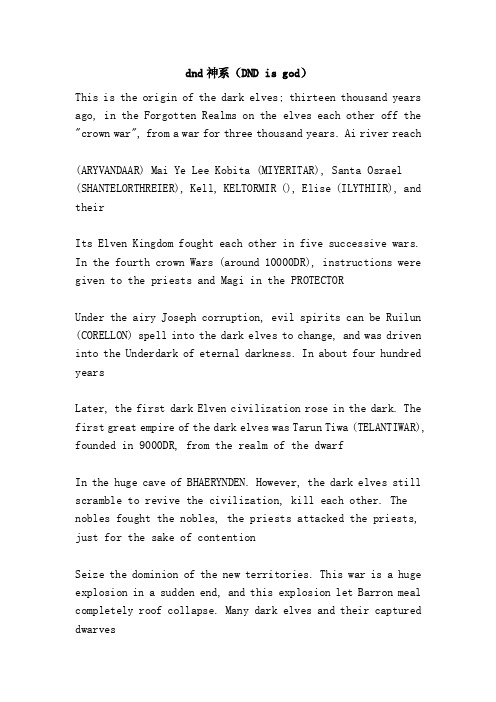
dnd神系(DND is god)This is the origin of the dark elves; thirteen thousand years ago, in the Forgotten Realms on the elves each other off the "crown war", from a war for three thousand years. Ai river reach(ARYVANDAAR) Mai Ye Lee Kobita (MIYERITAR), Santa Osrael (SHANTELORTHREIER), Kell, KELTORMIR (), Elise (ILYTHIIR), and theirIts Elven Kingdom fought each other in five successive wars. In the fourth crown Wars (around 10000DR), instructions were given to the priests and Magi in the PROTECTORUnder the airy Joseph corruption, evil spirits can be Ruilun (CORELLON) spell into the dark elves to change, and was driven into the Underdark of eternal darkness. In about four hundred yearsLater, the first dark Elven civilization rose in the dark. The first great empire of the dark elves was Tarun Tiwa (TELANTIWAR), founded in 9000DR, from the realm of the dwarfIn the huge cave of BHAERYNDEN. However, the dark elves still scramble to revive the civilization, kill each other. The nobles fought the nobles, the priests attacked the priests, just for the sake of contentionSeize the dominion of the new territories. This war is a huge explosion in a sudden end, and this explosion let Barron meal completely roof collapse. Many dark elves and their captured dwarvesThe city was buried in this tragedy. It has now turned into an open-air cave, which was later known as the great fissure (GREATRIFT). The ancestors of the golden dwarf later re land in this landSettled down, the land and the intricate surrounding caves are called "DEEPREALM.". In the next era called the great exile, the remaining Dark Elves were dearFamily and priests gathered all the compatriots, slaves and remaining equipment fled into the underdark. Since then, numerous city and small settlements as in the old telantiwar Empire like bamboo shoots after a spring rainThe birth and demise in the field. Because of the dogma of the spider God, the rose goddess, most of the city of the dark elves is ruled by the priestess of the matriarchal society. Following the rose's pathIn the city, the dark elves are usually ruled by a few aristocratic families with a strict hierarchy. A small group of top aristocratic families is organized into a governing parliament, and the speaker is the firstPriestess of the highest order. Each family also consists of a top class priestess rule, these women are called mistress. The constant deadly competition continued between different families. Similarly, the priestess between each other without slackintrigue, so as to be able to obtain higher power. These are subject to a number of infighting, "if you cannot prove that it never happenedOver." As a result, the dark elves became a fairly popular race in the forgotten countries. Their combination of grace and cruelty has attracted a lot of attention. The renegade selfHave family blood, Xingxiazhangyi Drizzt has become one of the most popular characters. In addition, in the forgotten countries, almost inevitably the player will be involved in the two secret groupsIn conflict. One of them is the representative of the good power: the Harpers: they are secret societies composed of human and Elven minstrel and ranger. No matter in the cityIn or out of the country, their members are in secret activities. Their task is to keep the balance of the world and destroy many of the evil ones. San Tallinn (Zhentarim)Is another major in Tilburg, scattered town and hid the black crow fortress evil organization activities. They are also known as the dark intelligence network, most members of the evil priests, warriors, thieves and powerfulMaster。
英语姓名小词典
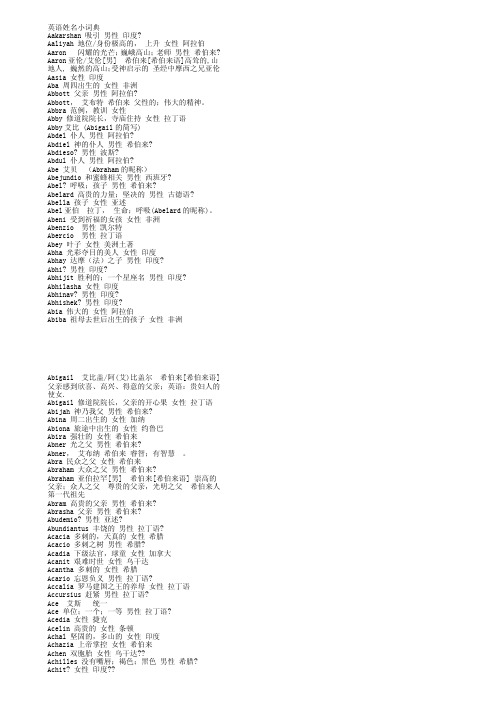
英语姓名小词典Aakarshan 吸引男性印度?Aaliyah 地位/身份极高的,上升女性阿拉伯Aaron 闪耀的光芒;巍峨高山;老师男性希伯来? Aaron亚伦/艾伦[男] 希伯来[希伯来语]高耸的,山地人, 巍然的高山;受神启示的圣经中摩西之兄亚伦Aasia 女性印度Aba 周四出生的女性非洲Abbott 父亲男性阿拉伯?Abbott,艾布特希伯来父性的;伟大的精神。
Abbra 范例,教训女性Abby 修道院院长,寺庙住持女性拉丁语Abby艾比 (Abigail的简写)Abdel 仆人男性阿拉伯?Abdiel 神的仆人男性希伯来?Abdieso? 男性波斯?Abdul 仆人男性阿拉伯?Abe 艾贝(Abraham的昵称)Abejundio 和蜜蜂相关男性西班牙?Abel? 呼吸;孩子男性希伯来?Abelard 高贵的力量;坚决的男性古德语?Abella 孩子女性亚述Abel亚伯拉丁,生命;呼吸(Abelard的昵称)。
Abeni 受到祈福的女孩女性非洲Abenzio 男性凯尔特Abercio 男性拉丁语Abey 叶子女性美洲土著Abha 光彩夺目的美人女性印度Abhay 达摩(法)之子男性印度?Abhi? 男性印度?Abhijit 胜利的;一个星座名男性印度? Abhilasha 女性印度Abhinav? 男性印度?Abhishek? 男性印度?Abia 伟大的女性阿拉伯Abiba 祖母去世后出生的孩子女性非洲Abigail 艾比盖/阿(艾)比盖尔希伯来[希伯来语] 父亲感到欣喜、高兴、得意的父亲;英语:贵妇人的使女.Abigail 修道院院长,父亲的开心果女性拉丁语Abijah 神乃我父男性希伯来?Abina 周二出生的女性加纳Abiona 旅途中出生的女性约鲁巴Abira 强壮的女性希伯来Abner 光之父男性希伯来?Abner,艾布纳希伯来睿智;有智慧。
Abra 民众之父女性希伯来Abraham 大众之父男性希伯来?Abraham 亚伯拉罕[男] 希伯来[希伯来语] 崇高的父亲;众人之父尊贵的父亲,光明之父希伯来人第一代祖先Abram 高贵的父亲男性希伯来?Abrasha 父亲男性希伯来?Abudemio? 男性亚述?Abundiantus 丰饶的男性拉丁语?Acacia 多刺的,天真的女性希腊Acacio 多刺之树男性希腊?Acadia 下级法官,球童女性加拿大Acanit 艰难时世女性乌干达Acantha 多刺的女性希腊Acario 忘恩负义男性拉丁语?Accalia 罗马建国之王的养母女性拉丁语Accursius 赶紧男性拉丁语?Ace 艾斯统一Ace 单位;一个;一等男性拉丁语?Acedia 女性捷克Acelin 高贵的女性条顿Achal 坚固的,多山的女性印度Achazia 上帝掌控女性希伯来Achen 双胞胎女性乌干达??Achilles 没有嘴唇;褐色;黑色男性希腊? Achit? 女性印度??Achlys 雾,黑暗女性希腊??Achyuta 毗湿奴神的一个名字男性印度Ackley 橡树牧场男性古英语Acton 有很多橡树的小镇男性古英语Acuzio 锋利男性拉丁语Ada 艾妲(达) 英国(希伯来语) 增光、增光的人快乐的美丽(Adelaide的简写)。
“God”翻译成“上帝”的历史演变及文化内涵
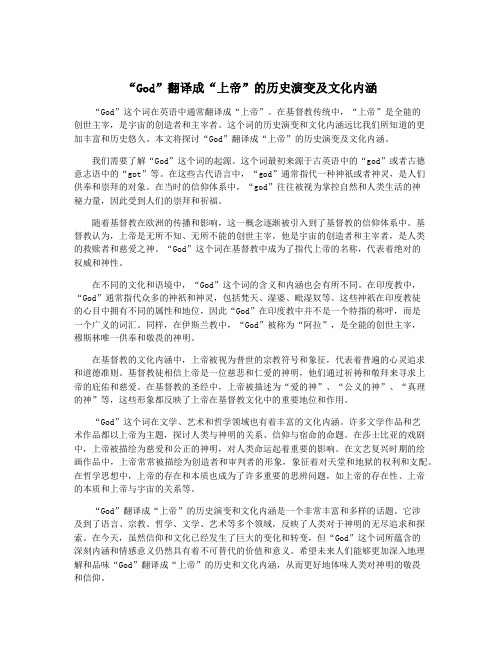
“God”翻译成“上帝”的历史演变及文化内涵“God”这个词在英语中通常翻译成“上帝”。
在基督教传统中,“上帝”是全能的创世主宰,是宇宙的创造者和主宰者。
这个词的历史演变和文化内涵远比我们所知道的更加丰富和历史悠久。
本文将探讨“God”翻译成“上帝”的历史演变及文化内涵。
我们需要了解“God”这个词的起源。
这个词最初来源于古英语中的“god”或者古德意志语中的“got”等。
在这些古代语言中,“god”通常指代一种神祇或者神灵,是人们供奉和崇拜的对象。
在当时的信仰体系中,“god”往往被视为掌控自然和人类生活的神秘力量,因此受到人们的崇拜和祈福。
随着基督教在欧洲的传播和影响,这一概念逐渐被引入到了基督教的信仰体系中。
基督教认为,上帝是无所不知、无所不能的创世主宰,他是宇宙的创造者和主宰者,是人类的救赎者和慈爱之神。
“God”这个词在基督教中成为了指代上帝的名称,代表着绝对的权威和神性。
在不同的文化和语境中,“God”这个词的含义和内涵也会有所不同。
在印度教中,“God”通常指代众多的神祇和神灵,包括梵天、湿婆、毗湿奴等。
这些神祇在印度教徒的心目中拥有不同的属性和地位,因此“God”在印度教中并不是一个特指的称呼,而是一个广义的词汇。
同样,在伊斯兰教中,“God”被称为“阿拉”,是全能的创世主宰,穆斯林唯一供奉和敬畏的神明。
在基督教的文化内涵中,上帝被视为普世的宗教符号和象征,代表着普遍的心灵追求和道德准则。
基督教徒相信上帝是一位慈悲和仁爱的神明,他们通过祈祷和敬拜来寻求上帝的庇佑和慈爱。
在基督教的圣经中,上帝被描述为“爱的神”、“公义的神”、“真理的神”等,这些形象都反映了上帝在基督教文化中的重要地位和作用。
“God”这个词在文学、艺术和哲学领域也有着丰富的文化内涵。
许多文学作品和艺术作品都以上帝为主题,探讨人类与神明的关系、信仰与宿命的命题。
在莎士比亚的戏剧中,上帝被描绘为慈爱和公正的神明,对人类命运起着重要的影响。
哈利波特中各种名字的来源
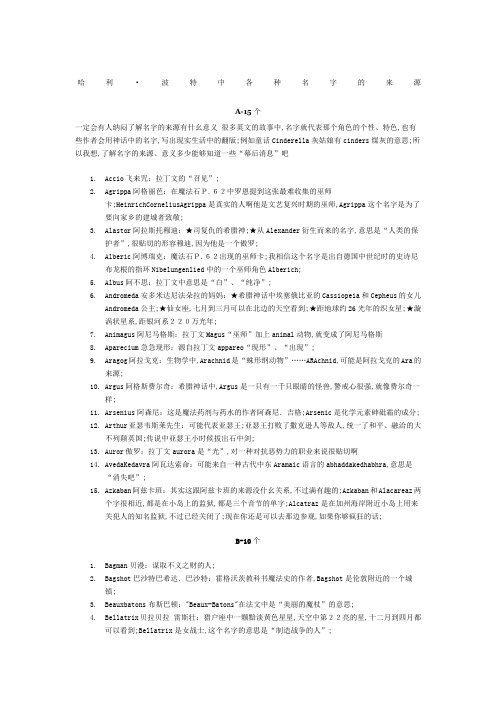
哈利·波特中各种名字的来源A-15个一定会有人纳闷了解名字的来源有什幺意义很多英文的故事中,名字就代表那个角色的个性、特色,也有些作者会用神话中的名字,写出现实生活中的翻版;例如童话Cinderella灰姑娘有cinders煤灰的意思;所以我想,了解名字的来源、意义多少能够知道一些“幕后消息”吧1.Accio飞来咒:拉丁文的“召见”;2.Agrippa阿格丽芭:在魔法石P.62中罗恩提到这张最难收集的巫师卡;HeinrichCorneliusAgrippa是真实的人啊他是文艺复兴时期的巫师,Agrippa这个名字是为了要向家乡的建城者致敬;3.Alastor阿拉斯托穆迪:★司复仇的希腊神;★从Alexander衍生而来的名字,意思是“人类的保护者”,很贴切的形容穆迪,因为他是一个傲罗;4.Alberic阿博瑞克:魔法石P.62出现的巫师卡;我相信这个名字是出自德国中世纪时的史诗尼布龙根的指环Nibelungenlied中的一个巫师角色Alberich;5.Albus阿不思:拉丁文中意思是“白”、“纯净”;6.Andromeda安多米达尼法朵拉的妈妈:★希腊神话中埃塞俄比亚的Cassiopeia和Cepheus的女儿Andromeda公主;★仙女座,七月到三月可以在北边的天空看到;★距地球约26光年的织女星;★漩涡状星系,距银河系220万光年;7.Animagus阿尼马格斯:拉丁文Magus“巫师”加上animal动物,就变成了阿尼马格斯8.Aparecium急急现形:源自拉丁文appareo“现形”、“出现”;9.Aragog阿拉戈克:生物学中,Arachnid是“蛛形纲动物”……ARAchnid,可能是阿拉戈克的Ara的来源;10.Argus阿格斯费尔奇:希腊神话中,Argus是一只有一千只眼睛的怪兽,警戒心很强,就像费尔奇一样;11.Arsenius阿森尼:这是魔法药剂与药水的作者阿森尼.吉格;Arsenic是化学元素砷砒霜的成分;12.Arthur亚瑟韦斯莱先生:可能代表亚瑟王;亚瑟王打败了撒克逊人等敌人,统一了和平、融洽的大不列颠英国;传说中亚瑟王小时候拔出石中剑;13.Auror傲罗:拉丁文aurora是“光”,对一种对抗恶势力的职业来说很贴切啊14.AvedaKedavra阿瓦达索命:可能来自一种古代中东Aramaic语言的abhaddakedhabhra,意思是“消失吧”;15.Azkaban阿兹卡班:其实这跟阿兹卡班的来源没什幺关系,不过满有趣的;Azkaban和Alacareaz两个字很相近,都是在小岛上的监狱,都是三个音节的单字;Alcatraz是在加州海岸附近小岛上用来关犯人的知名监狱,不过已经关闭了;现在你还是可以去那边参观,如果你够疯狂的话;B-10个1.Bagman贝漫:谋取不义之财的人;2.Bagshot巴沙特巴希达.巴沙特:霍格沃茨教科书魔法史的作者,Bagshot是伦敦附近的一个城镇;3.Beauxbatons布斯巴顿:"Beaux-Batons"在法文中是“美丽的魔杖”的意思;4.Bellatrix贝拉贝拉雷斯壮:猎户座中一颗黯淡黄色星星,天空中第22亮的星,十二月到四月都可以看到;Bellatrix是女战士,这个名字的意思是“制造战争的人”;5.Bode簿得:“预兆”或“延缓”;6.Boggart搏格特:★Baggart和Boggart发音一样,是爱尔兰文中的“威胁”;★美国、苏格兰和德国的传说都有类似的怪物:Bogey和Bogeyman美国、Bogle苏格兰、Boggelmann德国;7.Cassandra卡珊德拉卡珊德拉特里劳妮以及卡珊德拉瓦拉斯基:卡珊德拉特里劳妮是西比尔特里劳妮的玄祖母见凤凰社P.220;卡珊德拉瓦拉斯基是拨开未来的迷雾的作者;★Cassandra这个字的意思是“凶事预言家”、“不为人所信的预言家”;★在希腊神话中,太阳神Apollo爱上了特洛伊的Cassandra,他为了要让Cassandra爱上他,便送给她预言的能力,但是后来Apollo被拒绝了,愤怒的他就诅咒Cassandra,使得无人相信她所说的任何话;Cassandra从此备尝辛酸啊~例如在木马屠城记这个有名的希腊故事中,当希腊士兵留下大木马当作礼物,逃走之后,Cassandra警告她的父亲,也就是特洛伊国王Priam,不要高兴得太早,但是因为Apollo的诅咒,她父亲还是把木马带进城里面相信下面的剧情大家都知道,我就不多说了;★卡珊德拉瓦拉斯基的姓Vablatsky 可能来自“灵媒协会”TheosophicalSociety的创办人之一HelenaPetrovnaBlavatsky1831-1891A.D.,这个协会的目标为“穷究自然界难解现象,发掘人自身潜藏能量"……8.9.CedricDiggory塞得里克迪戈里:不知道大家知不知道,罗琳很喜欢一系列的书叫纳尼亚魔法王国TheChroniclesofNarnia,C.S.Lewis着;没有中文版其中一个男孩叫做DigoryKirke,重点是,这个男孩的名字可以缩写成D.Kirke,使用回文构词之后变成"Kedric",和Cedric很相似C有的时候发K的音喔~10.Charlie查理:这个名字是Charles的昵称,意思为“强壮的”、“高贵心灵的”、“男性的”;11.Chimaera客迈拉兽:怪兽及其产地中有介绍“人们所知仅有一例,说有一个巫师曾经成功地屠杀过一头客迈拉,那个不幸的巫师随后就因用力过度,筋疲力尽,从他胯下的那匹飞马身上坠落尘埃,一命呜呼;”其实这应该是罗琳小小地改编过的事情;本来是一个叫Bellerophon的英雄杀死了客迈拉兽,他因为太狂妄,想骑飞马登上神居住的奥林帕司山,遭到宙斯的惩罚,被飞马丢下去,终身残废;Chimaera有“人类改造自然之物而成的东西”的意思;C-7个1.Cho秋:日文的“蝴蝶”;2.Circe色斯:魔法石P.62的一张巫师卡;希腊诗人荷马的史诗奥迪赛,形容色斯是狡猾且厉害的女神;3.Cliodna克丽奥娜:在魔法石P.62中搔鼻头的女巫;在爱尔兰神话中,她是掌管美的女神,也掌管来生,又同时是海神;4.Colin柯林:意思是“小孩”、“婴儿”;5.ConjunctivitusCurse眼疾咒:Conjunctivitus来自拉丁文的coniugo“绑在一起”;医学名词conjunctivitis就是结膜炎;6.Cornelius康奈利福吉:参见“鲁休思”这个名字;7.Crucio钻心剜骨:拉丁文的意思是“凌虐、折磨”;D-11个1.Deletrius消隐无踪:来自拉丁文的deleo,指的是“清除”;2.Densaugeo门牙赛大棒:拉丁文denso是“牙齿",augeo是“生长”;3.DiagonAlley对角巷:念快一些会变成diagonally,“斜对地”;4.Diffendo四分五裂:来自diffindo,拉丁文的“折断”;5.Dissendium左右分离:来自拉丁文dissiedo,“分成两半”;6.Doreen多琳费格太太的中间名:Doreen的意思是“神的赠礼”;7.Draco德拉科:★天龙座,在较暖的月份中能在北半球的天空中找到;迦勒底人、希腊人和罗马人都认为这是一个龙的星座,印度神话说这个生物是一只短吻鳄鱼,波斯人认为是只吃人的蛇;★拉丁文的Draco意思是“龙”;★古希腊时候,有个残酷的雅典立法者Draco;8.Druidess德鲁伊特:这是魔法石P.62巫师卡克丽奥娜的名字;Druidess和Druid一样,是早期的巫师名称Druidess是女性,Druid是男性;这个字源于Celtic语,意为“了解橡树的”,在古时的英国和法国是知识阶级;9.Dumbledore邓布利多:古英语公元1150年前的英语中“大黄蜂”的意思;10.Durmstrang德姆斯特朗:相似的句子"Sturmunddrang"是德文字面上的“风暴与压力”;SturmundDrang指“狂飙运动”,是一种文学风潮,代表作家是哥德JohannWolfgangvonGoethe;11.Dursley德思礼:JK罗琳出生地附近的小镇名;E-5个1.ElfrictheEager:在魔法石P.162中,ElfrictheEager被人民文学出版社淡化成“小精灵叛乱的经过”,他是一个鼓动妖精叛乱的巫师;在盎格鲁撒克逊人统治时代有个叛国贼,本来是军队指挥官,在攻击的前一晚装病,并向敌人报信说他们可以逃脱;2.Enervate快快复苏:功用是恢复活力,但是英文的enervate或拉丁文的enervo的意思都是“衰弱”,跟这个功用相反;3.Erkling恶尔精:德国传说中的ErlKing精灵王调换字母的位子后就变成了Erkling德国诗人哥德JohannWolfgangvonGoethe的精灵王ErlKing中的描述和罗琳所写的一样喔4.ExpectoPatronum呼神护卫:拉丁文的expecto是“赶出去”,patronus是“守护者”;5.Expelliarmus除你武器:来自拉丁文e xpello“驱除”以及arma“武器”;F-12个1.Fawkes福克斯:从字典里面查到GuyFawkes,他是一个英国人,同时也是一个谋反的人;他企图用炮弹和烟火轰炸詹姆斯王一世和英国议会,这就是公元1605年11月5日的GunpowderPlot 火药阴谋事件,是天主教革命的开端;我一位住英国的朋友Michelle告诉我,英国有一个GuyFawkes节,用烟火和烧稻草人来庆祝;福克斯,是只凤凰,会浴火重生,多少跟GuyFawkes的烟火有些关连吧……感谢Michelle2.FideliusCharm赤胆忠心:来自拉丁文fidelus“忠实可靠”;3.Figg费格费格太太:相似字fig的意思是“微不足道的事”同时也是无花果,"figleaf"无花果叶有另一个意思是“隐蔽或伪装的事情”,费太太一直隐瞒哈利她是爆竹的事情;4.Filch费尔奇:“偷”的意思;5.FiniteIncantatem咒立停:来自拉丁文finite“结束”与incantantem,“魔咒”;6.Firenze费伦泽:意大利都市佛罗伦斯Florence之意大利文名称;7.Flagrate辣辣燃:可能由flame“火”和grate“火炉”这两个字组成;8.Flint福林马科福林:可能取自金银岛TreasureIsland的JohnFlint船长;9.Flitwick孚利维:英国的一个小镇名;10.FleurDelacour芙蓉德拉库尔:"Fleur-de-la-Cour"是法文的“宫廷之花”,指备受荣宠的贵妇;11.Fluffy路威:希腊神话中的守卫地狱之门的三头狗;12.Fudge福吉:"Fudge",除了是一种好吃的甜点之外,还有一个意思是“胡说八道”、“捏造”;在比较粗俗一点的言语中,指的是“在不彻底但还可以接受的程度下完成";这跟福吉的性格很像嘛……G-7个1.Gilderoy吉德罗:★因长相英俊而知名的拦路抢劫的强盗;★可能从gilded和Roy而来,gilded的意思是“粉饰”、“镀金”;Roy在古法语公元800-1400年间的法文中是“国王”的意思;2.Ginny金妮:Virginia这个名字的昵称,意指“纯洁的”;3.Granger格兰杰:意思是“农民”,可能代表妙丽出生于平凡的麻瓜家庭;4.GrimmauldPlace格里莫广场:就像DiagonAlley对角巷和KnockturnAlley翻倒巷一样,把GrimmauldPlace念快一点就会变成"gri moldplace",“狗灵老地”,跟小天狼星有点关连哈利误以为小天狼星是狗灵;5.Gryffindor格兰芬多:法文是“金色的葛来芬”这个or是法文的“黄金";狮身鹰首兽griffin是一种半狮半鹰的动物,原产于印度;负责守护黄金;6.Goblin妖精:这个字由希腊文kabalos混混而来;7.Goyle高尔:可能出自gargoyle,一种传说中在屋顶出现的怪物;或是gargouille,是一种产于法国的像蛇的龙;H-8个1.Hedwig海德薇:13和14世纪时德国的一个圣人;意思是“战役中的庇护”,St.Hedwig有七个小孩,而且结过好几次婚;她照顾生病的人,扶持穷苦的人;甚至有一间学校以她为名呢这个学校专门教育被遗弃的小孩或孤儿;你看到相关性了吗 Hedwig照顾孤儿,哈利是孤儿~2.Hengist汉吉斯:魔法石P.62的巫师卡;德文的“育种马”;3.Hermes赫梅斯珀西的猫头鹰:★传令者就是送信的啦;★希腊神话中的雄辩之神;4.Hermione赫敏:★意思是“石头”、“出身高贵”或“雄辩”;★Hermes这个名字的女性型式;★希腊神话中,Hermione是特洛伊的Helen和斯巴达的Menelaus王的女儿;Hermione常被神话说到她的高智能,以及被世人讨厌因为太聪明,太高傲的事情;★Hermione也是莎士比亚着作冬天的故事ATaleofWinter中的一个人物;这个人物变成了一座雕像,和密室的情节一样5.HerpotheFoul卑鄙的海尔波:怪兽及其产地中,卑鄙的海尔波是第一个孵育出蛇怪的人;希腊文的herpein是“爬行”;6.Hippocampus马头鱼尾海怪:怪兽及其产地可以找到马头鱼尾海怪;这个名字是从希腊文的hi ppo“马”和拉丁文的campus“陆地”;正巧,马头鱼尾海怪原产于希腊;7.Hippocrates希伯克拉特希伯克拉特斯梅绥克,韦斯莱先生的主治疗师:Hippocrates是一位古希腊名医;8.Hippogriff鹰马:鹰马是由griffin狮身鹰首兽,见Gryffindor格兰芬多和希腊文的hippo“马”组成;I-3个1.Ignatius伊格内修斯珀西的中间名:★意思是“火”头发火红;★一个历经苦难的主教,保护人们不遭到迫害,结果被国王丢去喂了狮子;★12月20日是希腊东正教庆祝的St.Ignatius节;2.Impedimenta障碍重重:来自拉丁文impedimetntum“阻碍”;英文impedimenta的意思是“累赘”;3.Imperio魂魄出窍:拉丁文“发号施令”;J-1个1.Jigger吉格尔雅森尼.吉格尔:魔法药剂与药水的作者,这是一种液体的单位,比盎司大一点;K-1个1.KnockturnAlley翻倒巷:如果把这两个字念快一点,会连起来变成nocturnally,意思是“夜间发生的”,很符合翻倒巷呢L-6个1.Lily莉莉:“纯洁”;2.Lockhart洛哈特:接近澳洲小镇WaggaWagga沃加沃加密室P.95:“家庭作业:就我战胜沃加沃加的事迹写一首诗”的一个镇名;3.Lucius卢修斯:★名字很像Lucifer,也就是恶魔撒旦的别名;★一个罗马将军LuciusCorneliusSulla被罗马人民夺权,但最后打败了他们,开始独裁统治;开始独裁之后,他把政府的决定权归还给罗马元老院,建立一个稳固的共和政体;Cornelius就是福吉的名字:康奈利4.Lumos荧光闪烁:lumen拉丁文的意思是“光”;5.Luna卢娜:★罗马神话中的月神;★银的另一种称呼;6.Lupin卢平:★相似字lunar意思是“月亮”;★Canislupus是狼的学名;这两项都完美的描述了路平这个狼人呢M-10个1.Malfoy马尔福:★法文中malfoi的意思是“坏的信仰”;★起源于拉丁文maleficus,意为“作恶的人”;2.Manticore人头龙身狮尾怪:出现在阿兹卡班的囚徒P.132源于古波斯文的食人兽martikhora,以及印度文的martichoras;3.Marietta毛莉:张秋的朋友,Marietta的意思是“一点点苦”;4.Maxime马克西姆:法文中“巨大”的意思;跟她的体型一样5.Merpeople人鱼:得名于拉丁文的mare“海”;6.Minerva米勒娃麦格教授的名字:★在罗马神话中她是司智能、工艺、发明的女神;★在希腊神话中她是战争的女神;7.Moody穆迪:“郁郁寡欢”;8.Morsmordre尸骨再现:是mors拉丁文“死亡”和modere拉丁文“咬”的综合体;9.Mosag莫萨格阿拉戈克的老婆:密室P.163,很多人都没注意到这只蜘蛛是盖尔文“肮脏、惹人厌的女人”;10.Mundungus蒙顿格斯:意思是“发臭的烟草”;N-7个1.Narcissa水仙:这个名字来自于希腊神话的Narcissus,这个美少年因为太虚荣,爱上自己,某天在赞叹自己在水中的倒影多幺好看时,掉进湖里溺死了;溺死后Narcissus变成一朵水仙花;2.Nagini娜吉妮伏地魔的蛇:梵文的naga是“蛇”;3.Neville纳威:在古法语公元800到1400年间中是“从新的农田来”的意思;4.Newt纽特牛顿“纽特”阿蒂米斯菲多斯卡曼:怪兽及其产地作者;newt是小的火蜥蜴;5.Nimbus光轮光轮系列飞天扫帚:★在气象术语中nimbus是“雨云”;★希腊神话中的一个神;6.Norris洛丽丝太太:JK罗琳最喜欢的作者JaneAusten傲慢与偏见作者笔下的一个角色;7.Nox诺克斯:★拉丁文的“黑暗”;★Nox是罗马神话的夜之女神;这也就是为什幺诺克斯是荧光闪烁的相反咒语啰O-4个1.Obliviate一忘皆空:来自oblivio,拉丁文的“善忘”、“恍惚”;2.Occlumency大脑封闭术:occlude是“封闭",mens在拉丁文中是“心灵”的意思;3.Olympe奥里姆马克西姆夫人:olympe指的是Olympus山上的一批巨人;4.Orchideous兰花盛开:orchid是“兰花”;所以这个咒语可以产生一束花P-10个1.Padma芭玛:恒河的女神;Parvati的姊妹;2.Parvati帕瓦蒂:印度的一个女神,是恒河女神Padma的姊妹;嫁给印度司破坏及拯救的神Siva;3.Patil巴提:相似的Patel是常见的印度姓氏;4.Peeves皮皮鬼:peeve意思是“小恶魔”或是“使你生气”;5.Pensieve冥想盆:从法文的penser“思考”和sieve,一种过滤液体的器具两字创造出来;6.Percival博知维邓布利多的中间名:★亚瑟王的圆桌武士其中之一叫做Percival;★这个名字的意思是“破坏者”;7.PetrificusTotalus统统石化:petra,拉丁文“石头”;8.Phyllida菲利达菲利达.斯波尔:千种神奇药草与蕈类作者,从希腊文的phylum来的,意思为“叶子”;9.Potter波特:罗琳邻居家的姓;10.PriorIncantatem闪回前咒:prior意思为“先前的”,incantatem是拉丁文的“咒语”;很合理吧Q-3个1.Quibbler唱唱反调:quibble的意思就是“谬论”、“模棱两可的话”,而quibbler当然就是说谬论、模棱两可的话的人啰2.Quietus嘘嘘静:quietus在拉丁文中是“安静”;3.Quirrel奇洛:跟squirrel松鼠很像,你不觉得奇洛的口吃、动作都很像一只小松鼠吗R-9个1.Ramora锚鱼:拉丁文原意为“延迟”;锚鱼可以挡住船只不让其通行;2.Reducio速速缩小:出现在火焰杯P.129,一个比较冷门的咒语reduce就是英文“缩小”;3.Regulus雷古勒斯小天狼星的弟弟:Regulus是狮子座的第一星,也就是狮子座的alpha希腊文的第一个字母星,Regulus念起来就像alpha又一个以星星命名的人物,罗琳这幺做是不是有特殊意义呢4.Remus莱姆斯:Romulus罗马的创立人的兄弟,他们两个被一只母狼养大;Remus被Romulus杀死兄弟阋墙;5.Reparo修复如初:源自拉丁文reparare,“修理”;6.Rictusempra咧嘴呼啦啦:来自拉丁rictus,“咧着嘴笑”;7.Riddikulus滑稽滑稽:ridiculous意思就是英文的“荒唐”;8.Ronan罗南马人:一位爱尔兰圣人,刚好这只人马的毛是红色的爱尔兰的人头发通常是红的9.RubeusHagrid鲁伯海格:★如果你是一个古英语中的hagrid,意思就是你有一个糟糕的夜晚;★HagridRubeus是希腊的珠宝之神,是Olympus山众神的住所的看守人,工作和海格很像喔S-12个1.Salazar萨拉查萨拉查史莱特林:罗琳在葡萄牙住过,所以我想这可能有关连;一位公元1932至1968在位的葡萄牙独裁者AntoniodeOlveiraSalazar以严峻的政令出名;2.Scamander斯卡曼纽特斯卡曼,怪兽及其产地作者:★这个字听起来像salamander火蜥蜴,怪兽及其产地中有;★Scamander是一条河的名字,在古希腊的Homer荷马史诗TheIliad中有提及,这条河和Achilles交战,最后被火制伏;TheIliad主要内容是歌咏Troy特洛伊战争;3.Serpensortia蛇蛇攻:serpent是“蛇”,而sortia类似于sortie“突击”;4.Severus西弗勒斯:"Sever"是“切断”之意;"Severe"也有“严厉的”之意;在古代历史上,卢修斯塞普蒂缪斯西弗勒斯在混乱的康莫得斯帝国之后保持了罗马帝国的稳定,内战在人们对康莫得斯的谋杀罪的觉醒之中爆发了;5.6.Sibyll西比尔西比尔特里劳妮:Sibyll这个名字来自于希腊神话中一群着名的先知,Sibyls,她们常能预知未来,侭管根本没有人去问;7.Sirius小天狼星:源自希腊文seirios“燃烧”,我们能看到的星星中,天狼星最亮也可称做“狗星”;这颗星是埃及的Isis女神的象征,埃及的宗教、信仰都以它为中心,相当重要;8.Skeeter斯基特丽塔斯基特:好名字,Skeeter是蚊子的俗称,大家都清楚的知道,也一定亲身体验过,世界上最烦人的生命体就是蚊子;9.Snape斯内普:一个英国小镇的名字;10.Sonorus声音洪亮:这是拉丁文的“大声”;11.Spore斯波尔菲利达.斯波尔,千种神奇药草与蕈类作者:spore就是植物的孢子;12.Sprout斯普劳特斯普劳特教授:太明显了,草药学教授教学生会sprout“发芽”的植物13.Stupefy咄咄失:英文的“使昏昏沉沉”、“使麻木”,所以咄咄失是昏击咒;U-1个1.Umbridge乌姆里奇:这个字念起来像umbra ge“阴影”、“愤怒”,这样解释吧,乌姆里奇常常生气,为霍格沃茨带来黑暗的阴影~V-4个1.Vablatsky瓦拉斯基卡珊德拉瓦拉斯基,拨开未来的迷雾的作者:来自一个TheosophicalSociety灵媒协会的创办人之一HelenaPetrovnaBlavatsky公元1831至1891年,这个协会的目的是发觉人自身的浅藏力量;2.Veela媚娃:起源于中欧的传说,为风的精灵,原本是女人,因为死后魂魄没有离开人世而变成媚娃;3.Veritaserum吐真剂:★拉丁文Veritas是“真理”,serum在英文中是“药剂”;★另一种可能,法文的serumdeverite,指一种强迫别人说出实话的魔药;4.Voldemort伏地魔:★中世纪有一个邪恶的巫师叫做Voldermortist,意思为“邪神”、“黑魔王”;传说中Voldermortist在亚瑟王KingArthur统治时期前有试着要杀死梅林Merlin一次,他对好人施咒,找坏人当他的手下;结果Merlin只用一个简单的麻痹咒语就解决了,最后Voldermortist被拿去喂一只多头的野兽;★法文中Voldemort意思是“逃过死亡”,就如那个人想要永生一样;★mort是一种“通知猎物已死的号角声”;★作家EdgarAllanPoe笔下有一个角色叫做M.Valdemar,他在催眠状态下被杀死,后来复活;W-2个1.Weasley韦斯莱:非常有趣;亚瑟是RonWeasley罗恩韦斯莱王的顾问,RonWeasley在另一个语言中叫做RunningWeasel奔跑的黄鼠狼……;RunningWeasley是第六帝国时期的一个军阀,策略家,从来没输过一盘棋跟罗恩一模一样呢很不幸的,他的士兵只因为好玩,把一只老鼠染成黄色的时候不会是斑斑吧罗恩一年级就在火车上想把斑斑变黄,不小心打翻了一盏油灯,导致RunningWeasel宫殿的烧毁还有他本人的死亡;2.3.WingardiumLeviosa羽加迪姆-勒维奥萨:wing就是“翅膀”,levis是拉丁文的“轻盈”;。
英语单词常用词根二

第四部分1.ubl,bili=able,表示“能力”able a 能够的ability n 能力habilitate v 装备;使具备能力(h 可看作have+abilit+ate→有能力→使具备能力)rehabilitate v 修复,翻新;使健康;改造(犯罪)(re重新+hubiliate 具备能力)debilitate v 削弱力量,使衰弱(de 去掉+abilit+ate→去掉能力→使衰弱)debility n 体弱,虚弱(de 去掉+ability 能力)2 .agog=lead,表示“引导”demagogue n 煽动者(dem 人民+agogue→引导肉民者→煽动者)pedagoue n 教师(ped 儿童+agogue→引导儿童者→教师)agog a 渴望的,热心的(引导人往前走的心情→渴望的)3.agon=struggle,表示“挣扎,斗争”agony n 痛苦agonize v 感到苦恼(agon+ize)antagonize v 反对,对抗(ant[=anti 反]+agon+ize→反过来斗争→对抗)antagonist n 对手(ant[=anti 反]+agon+ist→反过来斗争之人→对手)4 .alb = white,表示“白色”albsecent a 发白的(alb+escent 产生……的→产生白的)albino n 白化病(alh+ino 表示某种病)album n 相册;集邮册(alb+um 表示物→空白的东西→用来放东西的册子)5 .alg=pain,表示“痛”neuralgia n 神经病(nrur 神经+alg+ia→神经痛的病)nostalgia n 思乡病(nost 家+alg+ia→想家)analgesic n 止痛药(an 无+alg+esic 药物→无痛药物→止痛药)6.alt=high,表示“高”altitude n 高度(alt+itude 表名词)altimeter n 高度计(alri+meter 测量计)alto n 男高音(alt+o)altar n 祭坛(alt+ar→高出的东西→祭坛)exealt v 升高,赞扬(ex 出+alt→高出来→升高;赞扬)exalted a 高贵的;被赞扬的7 .ampl = large,表示“大”ample a 宽大的;充足的amplify v 放大,扩大(ampl+ify 表动词→扩大)amplitude n 广大,宽阔(ampl+itude 表名词)8.anci,antiq=old,表示“古老”ancient a 古代的(anci+ent)ancientry n 古旧;古代事物(ancient 古代的+ry 表名词)antique a 古代的n.古物antiquated a 陈旧的(antique+ated)antiquity n 古旧,古代(antique 古代的+ity)9.andro=male,man 表示“男人”aoderogynous a 不男不女的(andro+gyn 妇女ous)android n 机器人polyandry n 一妻多夫制(poly 多+andry 男人)10.arbit(r)=judge,表示“判断”ablter n 仲裁人;泰斗(arbit+er 表示人)arbirary a 武断的(arbitr+ary→做出[自己的]判断→武断的)arbitrate v 仲裁,公断(arbitr+ate)11 .arc(h)=bow,表示“弓”archer n弓箭手(arch+er 人)arch n 拱形arcade n 连拱廊(arc+ade 表名词,如cascade 瀑布)12.arm=weapon,表示“武器”armada n 舰队(arm+ada 表名词,通常表示群体)armistice n 休战;停战条约(armi+stice[=stand 停止]→武器停止→休战)armor n 盔甲(arm+or)disarm v 解除武器(dis 去掉+arm→去掉武器)armament n 军队;兵器(arm+a+ment→武器→兵器)13 .aug =increase,表示“增加”augment v 增大(aug+ment)auction n 拍卖(auct[=aug]+ion[价钱]扩大→拍卖)august a 威严的august n 八月(八月是水果长大的季节)augury n 预兆,征兆(augu+ry→[使事态扩大的]预兆,augur 愿意是“鸟”的意思,古人根据看到什么“鸟”来做出预料)14 .balm=balsam,表示“香油”balm n 香油;安慰物balmy a 芬芳的;温和的(balm+y)embalm v 保存尸体;铭记(em 进入+balm→古人用香油等保存尸体,引申为铭记)15.ban=prohibit,表示“禁止”ban n 禁止;禁令banal a 平庸的;陈腐的(ban+al→被禁止的→陈腐的)banish v 流放,驱逐出境(ban+ish 表动词→禁止入境→驱逐)abandon v 抛弃,放弃(a 不+ban+don 给予→不禁止给出去→放弃)16.bar=weight 表示“重,压”baric a 气压的barometer n 气压针(baro+meter 计量器)baritone n 男中音(bari+tone 声音→压下去的声音→男中音)17.barr=sticj,表示,“捧,栏”barrage n 阻塞,遮断(barr+age 表名词→用捧拦住→阻塞)barricade n 障碍物(barr+ic+ade 表名词)barrier n 栅栏(barr+ier)embarrass v 使发育,使难堪(em 进入+barr+ass 表名词→被拦住→使难堪)18 bat=beat,表示“打,击”batter v 连续猛打(bat+ter 常表示连续动作,如stutter口吃)abate v 减少,减轻(a 不bat+e→不再打击→减轻[痛苦]等)debate v 辩论,讨论(de 加强+dat+e→加强打击→反驳,辩论)rebate v 减少;回扣(re 回+bat+e→打回去的[东西]→回扣)combat n 战斗(com 共同+bal→共同→共同打→战斗)baton n 棍,警棍(bat+on)battle n 战斗(batt+le)battalion n 营(batt+alion 表名词→打的[队伍]→部队的营)19.biblio=book,表示“书”bibliography n 书目提要(biblio+araphy 学科→书的学科→书目提要)bibliophile n 藏书家(biblio+phile 爱→爱书的人)Bible n 圣经biblophobla n 憎恶书籍(biblio+phob 恨+ia 病→恨书的病)20.blanc=vwhile 表示“白”blank a 空白的(blanc 的变体blanket n 毯子(blank+et→白色[织物]→靴子)blanch v 漂白,发白(blanc 的变体)21.brace=two arms ,表示“两臂”brace v 支持,使坚固的n. 支持物bracelet n 手镯(brace+let 小东西→带在手上的小东西→手镯)embrace v 拥抱;包括(em 进入+brace→进入两臂→拥抱)22.braid = twist,表示“扭”braid v 编成辫子upbraid v 叱骂,谴责(up 向上+braid→向上扭→扭住不放→叱骂)embroidery n 刺绣(em 使+broid[=braid]+ery→使[线]扭在一起→刺绣)23,bu=ox,表示“牛”bull n 公牛bully v 欺负(别人)(象公牛一样吓唬别人)bucolic a 牧场的,田园的(buc+olie 表形容词)buffalo n 公牛(可能是bull 的变体)bugle n 军号,喇叭(bull+angle 的组合)24.calc=stone,表示“石头”calculate v 计算(calc+ulate)calcfy n 钙化;僵化(calc+ify)recalcitrant a 顽固的;不服从的(re 重新+|calc+itrant 表形容词→重新变成石头顽固的)calcium n 钙(cale+ium 表名词,常指化学元素,如;alu-minium 铝)25.calori=heat,表示“热”calorie n 热卡calorify v 加热(calor+ify 表动词)calorifacient a 生热的(calori+fac 做+ient→做出热→生热的)26.camp = field 表示“田野”camp n 营地campus n 校园(camp+us)encamp v 宿营(en 进入+camp 营地)campaign n 战役(camp+aign 名词后缀→营地→战役)27.car,char=dear,表示“可爱的”caress v /n.爱抚,拥抱charity n 慈爱(char+ity)charitable a 慈善的(charity+able 能…..的)cherish v 珍爱(cher[=char]+ish 表动词,如finish)28.Card chart=paper,表示“纸片”chart n 图表charter n 特许状;契约(chart+er→纸上的东西→契约等)chartered a 特许的;包租的(用契约的形式把东西包下来)discard v 放弃,抛弃(dis 去掉+card+把[废纸]扔掉→抛弃)29.cast=pure,表示“纯洁”caste n 种姓制度chaste a 纯洁的(chast=cast)castigate v 惩罚;严厉批评(cast+igate 表动词→使…纯洁→惩罚[错误])30.cav=hole,表示“洞”cave n 洞穴cavity n 穴;腔(cav+ity)cavelet n 小洞(cave+let 小东西→小洞穴)cavern n 大洞concave a 凹面的(con 全部+cave→全部像洞一样→凹进去的)excavate v 挖掘(ex 出+cav+ate→从洞中出来→挖出)excavation n 挖掘;出土文物31.cwns= judge,表示“判断”censor a 审查员(cens+or→判断之人→审查员)censorious a 挑剔的(censor+ious→用审查员的[眼光]看→挑剔的)censure n 责难(cens+ure→判断审查[别人]--责难)census n 人口普查(cens+us 表名词→查[人口]→普查)32.chor=sing,dance,表示“歌,舞”chaorus n 合唱(队)(chor+us 表名词)choreographer n 舞蹈动作设计者(chor+eo+graph 写+er人→写舞蹈的人)choreography n 舞蹈设计(chor+eo+graphychoir n 合唱队(choir=chor)33.ehrom=color,表示“颜色”monochrome a 单色的(mono 单个+chrome 颜色)chromatic a 彩色的(chrom+atic 形容词后缀)chromosome n 染色体(chrom+o+some 形体)34.cil=call,表示“召集”conceiliate v 安抚,劝诱(con 共同+cil+iate→把人召集到一起来→安抚[别人])conciliatory a 安抚的(conciliate+ory)reconcile v 和解(re 再+con+cil+e→[双方]再次召集到一起→和解)irreconcilable a 不可调和的(ir 不+reconcile+able能…..的)35 civ=citizen,表示“公民”civil a 市民的civlity n 谦恭,礼仪(civil 市民→文明+ity→谦恭有礼)civilian n 民众,平民(civil+ian)civilization n 文明,文化(civil 市民→文明+ization[ize+ation]→文明)36 .coct= cook,表示“煮,调配”concoct v 编造,虚构(con 全部+coct→全部是调配出来的→编造)decoct v 煎,熬(de 强调+coct→不断煮→煎熬)precocious a 早熟的(pre 提早+coc+ious→提早熟→早熟的)precocity n 早熟(pre+coc+ity)37.cogn=know,表示“知道”cognition n 认知,认识(cogn+ition)cognizable a 可认识的(cogn+ize+able→能够知道的)cognizant a 知晓的(cogn+ize+ant)recognize v 认出(re 再+cogn+ize→再次知道→认出来)precognition n 预知,预见(pre 预先+cogn+ition→预先知道→预知)38.com=banquet,表示“宴会”comedy n 喜剧(com+edy 表名词→像宴会一样热闹→喜剧)comic a 好笑的(由喜剧而来)encomiun n 高度赞扬(en 进入+com+ium→开宴会庆祝→高度赞扬)39.cond =hide ,表示“藏”abscond v 潜逃(abs 离开+cond→藏起来离开→潜逃)recondite a 深奥的(re 一再+cond+ite→[意义]一再被藏起来→深奥的)condiment n 调味品(cond+I+ment→藏起[坏味道]→调味品)40.corn=horn 表示“角”unicorn n 独角兽(uni 一个+corn→一个角→独角兽)cornet n 号角(corn+et 表示物)cornucopia n 丰饶角(corn+u+cop 丰富+ia 表示物→表示丰富的角→丰饶角;记:copious 大量的)41.cosnt=world,表示“世界,宇宙”cosmic a 宇宙的cosmos n 宇宙cosmopolis n 国际都市(cosm+o+polis 城市→世界城→大都市)microcosm n 微观世界(micro 微小+cosm)macrocosm n 宏观世界(macro 宏大+cosm)42 .crit,cris = judge,discern,表示“判断,分辨”critical a 批评的;危险的(crit+ical)criticism n 批评crisis n 危机(cris+is→需要作出判断的时刻→危机时刻)criterion n 标准,准绳(作出判断的依据)hypocrite n 伪君子(hypo 在下面+crit+e 评判→在背后评判别人→伪君子)hypocrisy n 伪善(hypo+crisy)43.culp=fault,表示“错,罪”culpable a 有罪的;应受指责的(culp+able 有…的)inculpate v 归罪(in 使+culp+ate→使[别人]有罪→归罪)exculpate v 无罪释放(ex 出+culp+ate→从罪中出来→无罪释放)44.cuss = shake,表示“摇动”concussion n 冲击,震荡(con 全部+cuss+ion→全部摇动→震荡)discuss n 讨论(dis 分散+cuss→分散敲击[问题]→讨论)percussion n 撞击,震动(per 从头到尾+cuss+ion→一直摇动→震动)repercussion n 反响,影响(re 一再+percussion→一再引起震动→产生的影响,后果)45.custom= habit,表示“习惯”customary a 习惯性的customer n 顾客(custom+er 人→习惯(进商店的)人→顾客)accustorn v 使习惯(ac 使+cusrom→使习惯)46.cyn=dog,表示“狗”cynic n 犬儒主义者(cyn+ic→象狗一样活着的人)cynicism n 愤世嫉俗(cynic+ism→犬儒主义的cynosure n 小雄星座,引人注目的人,(cynos[=cyn]+ure→形状像狗的小熊星座)47.demn=harm 表示“伤害”condemn v 谴责,指责(com 共同+demn→共同伤害→谴责)condemnation n 谴责indemnity n 赔偿(物)(in 不+demn+ity→使不受损害→赔偿)indemnify v 赔偿(in+demn+ify)48.dens=make thick,表示“变浓厚”dense a 浓密的density n 比重;浓缩(dens+ity)condense v 浓缩(con 全部+dene 浓缩→全部浓缩)densimeter n 密度计(dens+I+meter 测量计)49.dexter = right,表示“右边”dexterous a 灵巧的,敏捷的(右手比左手灵巧)dexterity n 敏捷(dexter+ity)ambidextrous a 非常灵活的(amdi 两个+dextrous→两只手都和右手一样灵巧)dextral a 右边的;用右手的(dextr+al)50.di=day,表示“日,日子”diary n 日记dial n 日署meridian n 日中,正午(meri 中间+di+an→在日子中间→正午)antemeridian a 午前的(ante 前面+meridian→正午→在正午前面→午前)postmeridian a 午后的(post 后面+meridian 正午→午后的)51.dole=grieve,表示“悲伤”doleful a 悲伤的(dole+ful 充满…的)condole v 安慰,哀悼(con 共同+dole→共同的悲伤→哀悼)indolence n 懒惰(in 不+dole+ence→[失败]不知道悲伤→懒惰)52.dom=house,表示“屋,家”dome n 圆屋顶;大厦domestic a 家里的;国内的(dom+estic 表形容词→家里的)domesticate v 驯养(domestic 家里的+ate→使成为家里的→驯养动物)dominate v 支配,统治(domin[=dom]+ate→像家长一样→统治)indomitadle a 不可征服的(in 不+domitadle 可征服的)predominant a 主要的,支配地位的(pre 在前面+dominant支配的)53,dorm=sleep,表示“睡眠”dormitory n 寝室,宿舍(dorm+itory 表示场所)dormitive n 安眠的(dorm+itve)dormancy n 休眠;蛰伏(dorm+ancy)54.dox=opinion,表示“观点”orthodox n 正统思想(ortho 正+dox→正的观点→正统思想)heterodox n 异端思想(hetero 异+dox→异端思想)paradox n 勃论,相矛盾(para 半+dox→一半观点,另一半相反)55 .draw=pull,表示”拉”drawdack n 障碍,缺点(draw+duck→[把人]拉回来→缺点)drawl v 拉长语调说话withdraw v 撤回,缩回(with 向后+draw→向后拉→撤回)56.drom=run,表示“跑”aerodrome n 飞机场(aero 空气,航空+drom+e→跑飞机之地)syndrome n 综合症,症状群(syn 综合+drom+e→[各种病]跑到一起)dromedary n 善跑的骆驼(通常指用来赛跑的骆驼)dromometer n 速度计(drom+o+meter 测量计)57.cd=eat 表示“吃”edible a 可吃的,食用的(ed+ible 能够…..的)inedible a 不可吃的(in 不=edible)edacious a 贪吃的(ed+acious 多…的)edacity n 贪吃;狼吞虎咽(ed+acity 表示多的状态)58.ego=l.表示“我,自己”egoism n 利己主义egoist n 利己主义者egocentric a 自我中心的(ego+centric 中心的)agomania n n.极端利己主义(ago+mania 狂热病)59.emper,imper=command,表示“命令,统治”emperor n 皇帝(emper+or 人→命令之人→统治者)empire n 帝国(empir=emper)imperial a 帝国的(imper 帝国+ial)imperious a 专横的(相皇帝一样→专横的)imperative a 命令的,强制的(imper+ative)60.(a)esthet=feeling,表示“感觉”aesthetic a 审美的,美学的(对美有感觉)aesthetics n 美学anesthesia n 麻醉(an 没有+esthes+ia 病→没有感觉的病→麻醉)anesthetic n 麻醉剂81.glacier a 冰川(glac+ier)glacial a 冰河的;冰冷的glaciate v 使冰冻(glac+iate)glaciology n 冰川学(glac+io+logy 学科)82.gloss,glot=tongue 表示“舌头”,引申为“词语”ciglossia n 双语制的(di 二+gloss+ia)glossary n 难词表(gloss+ary 表名词)polyglot a 使用多种语言的(poly 多+glot)diglot a 使用两种语言的(di 二个+glot)83 .gran=grain,表示“颗粒”granary n 粮仓,谷仓(gran+ary 表场所→放粮食颗粒的地方)granivorous a 食谷的(gran+I+vor 吃+ous→吃粮食的)granule n 颗粒,细粒(gran+ule 表示小东西)granulate v 使成颗粒(granule 颗粒+ate)84.hal,halit=breathe,表示“呼吸‘inhale v 吸气(in 进入+hal+e)inhalation n 吸入,吸气(inhale+ation)exhalo v 呼气(ex 出+hal+e)halitosis n 口臭(halit[=hal]+osis 表示病→呼吸病→口臭)85.haust=draw water,表示“抽水”exhaust v 用尽;抽干(ex 出+haust→抽干→抽出)exhausted a 筋疲力尽的(exhaust+ed→[力气]被抽干了)exhaustive a 彻底的,穷尽的(exhaust+ive→用尽了全部方法→彻底的)inhaust v 吸,饮(in 进入+haust)86.hau=possess,表示“拥有”have v 有haven 避难所(hav+en 表示场所→有[全部]的场所)behave v 举动,举止(be 表示动作+have→[一个人]拥有的动作→举动)behavior n 举止行为(behave 的名词)87.head=head,表示“头”heading n 标题headline n 标题(head+line 字行→头一行字→标题)headstrsong a 倔强的(head+strong 强大→头很大→倔强的)heady a 轻率的,任性的(一头往前冲→轻率的)88 .helio=sun,表示“太阳”heliocentric a 以太阳为中心的(helio+centric 中心的)heliosis n 中暑(helio+sis 表示病→太阳病→中暑)heliotherapy n 日光疗法(helio+therapy 治疗)heliotropism n (植物)向日性(helio+trop 转+ism→转向太阳)89 .helic=spiral,表示“螺旋”helicopter n 直升飞机(helic+opt 选择螺旋上升→直升飞机)helical a 螺旋形的(helic+al)helix n 螺旋线90 .hilar=glad,表示“高兴”heitarity n 高兴,欢乐(hilar+ity 表示词)hilarious a 高兴的;热闹的(hilar+ious 表形容词)exhilarate v 使高兴,使兴奋(ex 出+hilar+ate→高兴益于言表)91.hor(r)=shudder,dread,表示“颤抖,害怕”horrid a 可怕的abhor v 憎恨(ab 表示动作+hor→又怕又恨→憎恨)abhorrent a 憎恶的(abhor[r]+ent)horrible a 可怕的(horr+ible)horrify v 使恐怖(horr+ify→使人害怕)92.hort=encourage,表示“鼓励”exhort v 力劝(人去做)(ex 出+hort→鼓励人出去做事)hortatory a 劝告的,忠告的(hort+atory 表形容词)93.hospit,host=guest,表示“客人”hospital n 医院(客气对待病人的地方)hospitality n 好客,殷勤的(hospit+ality 表性质名词)hostage n 人质(host+age 表名词→把客人[留住]→人质)hotel n 旅馆(客人住的地方)94 .hypno=sleep,表示“睡眠”hypnology n 催眠学(hypno+logy 学科)hypnotic a 催眠的(hypno+tic)hypnosis n 催眠状态(hypno+sis 表示病状)dehyonotize v 解除催眠(de 去掉+hypnotize 催眠)95.idol=image,表示“形象,偶像”idol n 偶像idolatry n 偶像崇拜(idol+arty 表名词)idolatrous a 崇拜偶像的(idolatry+ous)idolize v 崇拜;对….醉心(idol+ize…..化→偶像化→崇拜)96.imag,imit=imagine,lkeness,表示“想象,相象”image n 形象,图象imagine v 想象imaginative a 富于想象的(imagine+ative)imaginable a 可想象的(imagine+able)imitate v 模仿(imit+ate→做得相象→模仿)imitadle a 可模仿的(imit+able 能…的)inimtable a 无与伦比的(in 不+imitable)97.insul=isand,表示“岛屿”penimsula n 半岛(pen 接近+insula→接近岛屿→象岛屿→半岛)insular a 岛国的;偏狭的(insul+ar)insulate v 隔离;使绝缘(insul+ate→变成岛的状态→偏离)insulin n 胰岛素(insul+in 表示“…素”,如;penicillin青霉素)98.inter=whole,表示“完整”integral a 完整的(integr+al)integrity n 完整,完全(integr+ity)integrate v 使一体,使结合(integr+ate)disintegrate v 使瓦解,分裂(dis 分开+integr+ate→完整的分开→瓦解)disintegration n 瓦解;分裂99.joc=joke,表示“笑话”jocose a 滑稽的,可笑的(joc+ose 表形容词,如;lachy-mose 引人落泪的)jocular a 爱开玩笑的(joc+ular)jocund a 欢乐的,愉快的(joc+und 表形容词,如:rotund圆胖的)100 .journ=day,表示”日期“journal n 日期,杂志journalist n 记者(journal+ist 人)journey n 旅行,旅程adjourn v 延期;体会(ad 增加+jourm 增加日期→延期)sojourn v n.旅居;逗留(so[=sub 在….下面)+journ→在旅行→旅居)101 .jug=yoke,表示“牛轭”conjugal a 婚姻的;夫妻的(com 共同+jug+al→共同在轭下→共同承担夫妻责任)subjugate v 压服,征服(sub 在下+jug+ate→把….放在牛轭下→压服)conjugate v 使结合;使成对(con+jug+ate→共同在轭下→结合)102.lact=milk,表示“奶,乳”lactic a 乳汁的lactate v 分泌乳汁(lact+ate)ablactate v 使…断奶(ab 离开+lact+ate→离开奶→断奶)lacteal a 乳汁的;乳白的103.langu=faint,表示”虚弱“languid a 卷怠的(langu+id 表形容词,如:morbid 病态的)languish v 卷怠,衰弱(langu+ish 表动词,如:flourish繁荣)languor n 衰弱,憔悴(langu+or)104 .lapid=stone,表示”石头“lapidary n 宝石工(lapid+ary 表示人,如:iuminary杰出人物)dilapidated a 倒塌的,破旧的(di 坏+lapid+ate+ed→[砌墙]石头坏拉→倒塌,来源于动词di-lapidate)lapidify v 化成石头(lapid+ify 化)105 .later=side,表示”边“unilateral a 单边的(uni 单个+later+al)dilateral a 双边的(bi 双+later+al)equilateral a 等边的(equi 相等+later+al)lateral a 旁边的,侧面的106.lax=loose,表示“松”lax a 松弛的laxative n 缓泻药(lax+ative→放松的[药]→泻药)laxity n 松弛(lax+ity)relax v 放松,宽心(re 重新+lax→重新松开→放松)relaxation n 休息;娱乐(relax 的名词)107.lex,lexic=word,speech,表示“词汇”dyslexia n 阅读障碍(dys 不良+lex+ia 病→对词汇不良的病→阅读障碍)lexlcal a 词汇的;词典的(lexic+al)lexicographer n 词典编写者(lexic+o+grapher 写的人→写词典的人)iexicon n 词典;专门词汇(lexic+on)108.lidr=book,表示“书”library n 图书馆(libr+ary 表地方,如sanctuary 圣堂,避难所)libretto n 歌剧,音乐剧等的歌词;歌剧脚本(libr+etto表名词)librettist n 歌剧,音乐剧等的歌词作者(librett+ist)109.licen=allow,表示“允许”licence n 特许,许可证license v 批准,许可licentious a 放肆的;淫荡的(licen+t+ious→允许[做任何事]放肆的)illicit a 不合法的(il 不+licit[=liven]→不允许→不合法的)110.lic=allure,表示“引诱”delicate a 精致的,优美的(de 一再+lic+ate→一再引诱人的→精美的)delicacy n 精致,优美(de+lic+acy)delicious a 美味的,可口的(de 一再+lic+ious→[食品]v 引出,得出(e 出+lic+it 动词后缀,如;solicit恳请)111.linqu=leave,表示“离开”delinquent a 有过失的,犯法的(de 一再+linqu+ent→一再离开[正道]→有过失)delinquency n 失职,过失relinquish v 放弃,防开(re 远+linqu+ish→远离→放弃:re 表示“远”,如remote 遥远的)112.lips = leave,表示“离开”eclipse n 日(ce[=e 出]+lips+e[太阳]离开→日)ellipse n 椭圆(el 出+lips+e→[圆的边]离开圆心→椭圆)eclipsis n 省略(号)(ec 出+lips+is→[字]离开书本→省略)113.liqu=wet,表示“湿”liquid a 流体的,液态的(liqu+id 表形容词,如:stupid笨的)liquor n 酒;酒精饮料liquidate v 清偿(债务);清理(帐目)(liquid+ate→像把水弄清一样→清理)114.lun=moon,表示“月亮”lunar a 月亮的semilunar a 半月形的(semi 半+lunar)plenilune n 满月的(plen 满+I+lune)luniform a 月形的(luni 月+form 形状)115.lustr=light,表示“光亮”lustre n 光泽lackluster a 呆板的(lack 缺少+luster 光泽)illustrate v (il 给予+lustr+ate→给予光明→照亮)116.lys,lyst=break bown,表示“裂开,分解”analysis n 分析(ana 再次+lys+is 表名词→再次分解→分析)analyze v 分析(ana 再次+lyz[=lys]+e)catalyst n 催化剂(cata 向下+lyst→分解下去→催化[剂])paralysis n 麻痹(para 旁边+lysis 分开→旁边分开→麻痹)117.mach,mech=machine,表示“机器”machine n 机器macination n 阴谋,策划(machine 机器,引伸为操纵+ation→操纵→搞阴谋)mechanic n 机械师mechanize v 机械化(mechan 机械+ize)118.maj=great,表示“大,伟大”major a 较大的;主要的majority n 大多数(major 主要的+ity)majestic a 雄伟的,壮丽的(maj+estic 表形容词,如:a-grestic 农村的)majestic a 雄伟,壮丽(majestic 的名词)mayor n 市长(may[=maj]+or 人→大人→市长)119.man,main=stay,表示“逗留”permanent a 持久的,不变的(per 始终+man+ent→始终逗留→持久的)permanence n 永恒,持久immanent a 包含的;内在的(im 内+man+ent→留在内部→内在的)remain v 剩余,遗留(re 后来+main→后来留下的→剩余)remainder n 剩余物(remain+der 表示名词,如:attainder被剥夺公民权利及财产)maintain v 维持(main+tain 拿→拿住,留住→维持)120.mand=order,表示“命令”mandate v 命令,要求(mand+ate)demand v 苛求(de 一再+mand→一再令人做→苛求)countermand v 撤消(命令)(counter 反+mand→反命令=撤消命令)command v 命令,指挥(com 一起+mand→命令大案一起做→指挥)121 merc,merch=trade,表示“交易”commerce n 商业(com 共同+merce→共同交易→商业)commercial a 商业的n. 商业广告(com+merc+ial→共同交易的→商业的)mercenary a 惟利是图的n. 雇佣兵(mercen[=merc]+ary→像贸易一样→惟利是图的)merchant n 商人(merch+ant 表示人)marchandise n 商品(merchand[=merchant 商人]+ise→商人的东西→商品)122 mend=free from fault,表示“改错”amend v 改正,改过(a 加强+mend→不断改错→改正)amendment n 改正,(宪法)修正emend v 校订,改正(e 出+mend→改正出错误→改正)emendation n 校订123 milit=soldier,表示“兵”militant a 好战的(ilit+ant)military a 军人的,军队的(milit+ary)militia n 民兵,义勇军(milit+ia)militate v 产生(不利)影响(milit+ate→用兵[阻挡]→产生[不利]影响)demilitarize v 解除武装(de 去掉+milit+ar+ize→去掉战士→解除武装)124 mis(o)= hate,表示“恨”misanthropist n 厌世者(mis+anthrop 人类+ist→恨人的人→厌世者)misogamist n 厌恶结婚者(mmiso+gam 结婚+ist)misogyny n 厌恶女人(miso+gyny 女人)misoneism n 厌新,守旧(miso+ne[=neo 新]+ism→恨新→厌新守旧)125 mmiser= wretched 表示“可怜的”miser n 小气鬼(小气鬼活的很可怜)miserable a 可怜的(miser+able)misery n 可怜,可悲(miser+y)commiserate v 怜悯,同情(com 共同+miser+ate→共同可怜→怜悯)126mnes,mnem=remember,表示“记忆”amnesia n 健忘症(a 无+mnes+ia 病→无记忆病→健忘症)amnesty n 赦免(a 不+mnes+ty 表名词→不再记[恨]赦免)mnemonic a 记忆的,助记的(mem+onic 表形容词→记忆的;参考:laconic 简洁的)127 monstr=show,表示“显示”monster n 怪物(显示出来的怪物)monstrous a 巨大的;可怕的(来自monster)demonstrate v 证明,表明(de 加强+monster+ate→加强显示→证明)demonstration n 证明;示威游行remonstrate v 抗议,表示异议(re 反+monstr+ate→显示反对→抗议)remonstration n 抗议,反对128 moll=soft,表示”软“mollusc n 软体动物(moll+usc 可能来自husk“外壳”)mollify v 抚慰;变软(moll+ify 化→软化→抚慰)meollient n 润肤剂,软化剂(e 出+moll+ient→使东西软起来→软化剂)129 mor=moral,表示“道德:moral a 道德的morale n 土气,风气(mor+ale→[一群人]有道德精神→士气)demoralize v 使士气消沉(de 去掉+morale 士气+ize→去掉士气)mores n 道德观念;风俗(mor+es 表示复数)130 mord mors=bite,表示”咬“mordant a 尖锐的,刻薄的(mord+ant→咬人的→尖锐的)mordacity n 尖锐讽刺(来自形容词mordacious,mordd+acious)morsel n 一小口(食物)(mors-vel 表示小东西→咬一小口)remorse n 悔恨(re 回,反+morse→反过来咬自己→悔恨)131mur=uall,表示”墙壁“mural a 墙壁的n.壁画intramrual a 内部的,范围内的(intra 在…之内+mur+al→在墙之内的)immure v 监禁,禁闭(im 进入+mure→进墙→监禁)extramural a 墙外的,城外的(extra 外+mur+al→墙外的)132mus=muse 来自希腊神话“缪斯”女神,是文艺音乐女神,所以有“娱乐”的意思museum n 博物馆muse+um 表示场所)music a 音乐(mus+ic)musician n 音乐家(mus+ician 表示人)amuse v 娱乐,使…高兴(a 使+muse→使高兴)amusement n 娱乐,乐趣(amuse+ment)133 meur=mene,表示“神经”neurology n 神经病学(neur+o+logy 学科)neuropath n 神经病(neur+o+path 病)neural a 神经的neuritis n 神经炎(neur+it is 炎症,如;artjritis关节炎)134 nihil=nothing,表示“无,不存在”nihil n 虚无,毫无价值之物annihilate v 消灭(an 使+nihil+ate→使[东西]不存在→消灭)annihiation n 消灭,歼灭nihilism n 虚无主义(nihil+ism 主义)135 noct=night,表示“夜晚”noctilucent a 夜间发光的(nocti+luc 光+ent→夜晚发光的)noctambulate a 梦游的(moct+ambul 走+ate→夜间走路→梦游)pernoctation n 整夜不归(不眠)(per 整个+noct+ation→整夜不归等)nocturnal a 夜间(活动)的(noct+urnal 表形容词,如:diurnal 白天的)nocturne n 小夜曲,梦幻曲136 nost = home,表示”家”nostalgia n 思乡情(病)(nost+alg 病+ia 病→想家就痛的病→思乡病)nostomania n 思想狂(nost+o+mania 狂→想家狂)nostrum n 民间药,密药(nostr+um→家里的药物→民间药)137 null=none,表示“没有”null a 无效的,等于零的nullify v 取消,废除(null+ify)annul v 取消,废除(an 加强+nul[=null]→强调没有→取消)138 nutrit,nutri=nourish,表示“营养”nutrition n 营养;滋养(nutrit+ion)nutritious a 有营养的(nutrit+ious)malnutrition n 营养不良(mal 坏+nutrition 营养→营养坏[不良])nutrient n 营养品nutiment n 营养品139 od=song,表示“歌曲”ode n 颂歌melody n 旋律(mel[=希腊文melos 歌曲]+ody→歌唱歌曲→旋律)porody n 模仿歌唱(par 旁边+ody→在旁边歌唱→模仿歌唱)140 oner=load,表示“负担”onerous a 繁重的;费力的exonerate v 免除;无罪释放(ex 出+oner+ate→从负担中摆脱出来→无罪释放)onus n 负担,责任(on[=oner]+us 表示名词,如:nodus难点)141 optim=bext,表示“最好”optimsm n 乐观主义(optim+ism→向最好方面想的主义→乐观主义)optimistic a 乐观的(optim+ist+ic)optimum n (生物成长)最适宜的条件或环境(optim+um 表示场地,如:museum 博物馆)142 orbit=circle,表示“圆圈”orbit n 轨道orbital a 轨道的exorbitant a 过分的,过度的(exhu +orbit 轨道+ant→出轨的,过分的)143 oss=bone,表示“骨头”osseous a 骨头的(oss+eous 表形容词,如:bounteous 慷慨的,丰富的)ossify v 钙化,僵化(oss+ify)fossify v 变成化石(foss[=oss 骨头]+ify)fossll n 化石(foss[=oss]+il)144 ot(o)=ear,表示“耳朵”otophone n 助听器(oto+phone 声音→[帮助]耳朵听声音→助听器)otology n 耳科学(oto+ology 学科)otopathy n 耳病(oto+pathy 病otitis n 耳炎(ot+it is 炎病)oparotitis n 腮腺炎(par 旁边+ot+it is 炎症→耳朵旁边的炎症→腮腺炎)145 pact=fastened,表示“紧的”pact n 契约,公约(对双方加紧约束)compact a 压实的,压缩的(com 全部+pact→全部压紧→压缩的)impact n 冲击力;影响力(im 进入+pact→压进去的力量→影响力)146 palp=feel,表示“感觉,摸”palpable a 摸得着的(palp+able 能….的)palpitate v (心脏)悸动,快速跳动(patp+itate 表动作→摸得着的心跳)palpus n 触须(palp+us)147 par=get ready,表示“准备”parade n 游行(原意指部队训练场,引申为排队游行;部队训练,准备打仗)prepare v 准备(pre 预先+pare 准备→预先准备好)repair v 修理(re 再+pair→重新准备好→修理)apparatus n 仪器,设备(ap+par+atus 表名词→准备好用的东西→设备)148 par=bring forth,表示“生产,生出孩子”parent n 父母(par+ent)primiparous a 初产的(primi 最初+par+ous)multiparous a 多产的,多胎的(multi 多+par+ous→多生产的)uniparous a 每胎生一子的(uni 一个+par+ous→生出一个)149 parl=speak,表示“说话”parley n 谈判,会谈parlor n 客厅,谈话室(parl+or)parliament n 国会(parlia[=parley 会谈]+ment→会谈状态→国会)parlance n 说法,用语(parl+ance)150 par,pear=come in sight,表示“看见”apparent a 显而易见的(ap+par+ent→一再能看见→显而易见)transparent a 透明的;明白的(trans 穿过+par+ent→穿过去能看见→透明的)transparency n 透明度ppear v 出现(ap+pear→看见了→出现了)disappear v 消失(dis 不+appear 出现→不出现→消失)151 phan=show,表示“显示”phantom n 显现;幽灵(phan+tom)sycophant n 马屁精(eyco[=flg 无花果]+phant→显示无花果→献上无花果→拍马屁)diaphanous a 透明的(dia 对面+phan+ous→对面能显示出来)152 phor=bring,表示“带来”euphoria n 愉快感;欣快症(eu 美好+phor+ia 病→带来美好的病→欣快症)aphorism n 格言,警句(a+phor+ism→带来[思想,智慧]→格言)dysphoria n 烦躁不安(bys 坏+phor+ia 病→带来坏的病→烦躁不安)153 phyt(o)=plant,表示“植物”hyrophyte n 水生植物(hydro 水+phyte→水的植物)xerophyte n 早生植物(xero 早,干+phyte)phytogeography n 植物地理学(phyto+geography 地理学)154 pisc = fish,表示“鱼”piscary a 捕鱼场(pisc+ary 表示场所,如:aviary 养鸟场)pisvator a 捕鱼者(pisc+tor 人→鱼人→捕鱼者)piscivorous a 食鱼的(pisci+vor 食+ous→食鱼的)piscicuiture n 养鱼业(pisci+culture 养殖业)piscine a 鱼的(pisc+ine 表示形容词,如:ursine 熊的;equine 马的)155 place=place,表示“放,地方”displace v 移位;顶替(dis 去掉+place→把放的东西去掉→移位)replace v 复职;代替(re 重新+place→重新放→复职,引申为“代替”)replaceble a 可代替的(replace+able)replacement n 替代;复位(replace+ment)156 plaint=complain,表示“抱怨”plaintive a 痛苦的,伤心的(plaint+ive)plaintiff n 原告(plaint+iff 表名词,如:tariff 关税)palaint n 悲叹complaint n 抱怨(com 全部+plaint→对全部东西抱怨)157plaud=clap hands,表示“鼓掌”applaud v 拍手喝彩(ap+pland)applause n 鼓掌(applaud 的名词)plausible a 可行的;有理的(plaus+ible→能鼓掌通过的→可行的)plaudit n 称赞,赞美(plaud+it 表名词,如:pundit 权威人士,专家)158 pold=big noise,表示“大声音”plod v 拖重步子走路explode v 爆炸(ex 出+plod+e→出来大声音→爆炸)explosion n 爆炸(explode 的名词)implode v 内聚爆炸,猛然内缩(im 内+plode→向内爆炸)implosion n 内暴159 ploy=use,invlve,表示“用,参与”employ v 雇佣;运用(em 进入+ploy→进入用的状态→雇佣)employment n 雇佣,就业(employ+ment)deploy v 调度;部署(部队)(de 加强+ploy→加强使用[部队]→调度)ploy n (取胜的)策略,手法160 plumb=lead,表示“铅”plumb n 铅锤。
戈多到底是谁——以人物角色为例,分析《等待戈多》的创作特点
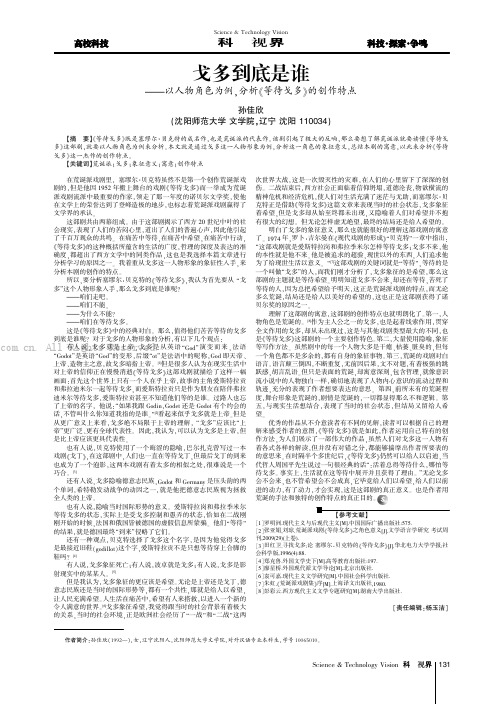
科技视界Science &Technology VisionScience &Technology Vision 科技视界在荒诞派戏剧里,塞缪尔·贝克特虽然不是第一个创作荒诞派戏剧的,但是他因1952年搬上舞台的戏剧《等待戈多》而一举成为荒诞派戏剧流派中最重要的作家,领走了那一年度的诺贝尔文学奖,使他在文学上的荣誉达到了登峰造极的地步,也标志着荒诞派戏剧赢得了文学界的承认。
这部剧共由两幕组成。
由于这部剧揭示了西方20世纪中叶的社会现实,表现了人们的苦闷心里,道出了人们的普遍心声,因此他引起了千百万观众的共鸣。
在痛苦中等待,在痛苦中希望,在痛苦中行动,《等待戈多》的这种概括所蕴含的生活的广度,哲理的深度及表达的准确度,都超出了西方文学中的同类作品,这也是我选择本篇文章进行分析学习的原因之一。
我着重从戈多这一人物形象的象征性入手,来分析本剧的创作的特点。
所以,要分析塞缪尔·贝克特的《等待戈多》,我认为首先要从“戈多”这个人物形象入手,那么戈多到底是谁呢?———咱们走吧。
———咱们不能。
———为什么不能?———咱们在等待戈多。
这是《等待戈多》中的经典对白。
那么,值得他们苦苦等待的戈多到底是谁呢?对于戈多的人物形象的分析,有以下几个观点:有人说,戈多就是上帝,戈多是从英语“God”演变而来,法语“Godot”是英语“God”的变形,后缀“ot”是法语中的昵称,God 即天帝、上帝、造物主之意,故戈多暗指上帝。
[1]但是很多人认为在现实生活中对上帝的信仰正在慢慢消逝《等待戈多》这部戏剧就描绘了这样一幅画面:首先这个世界上只有一个人在乎上帝,故事的主角爱斯特拉贡和弗拉迪米尔一起等待戈多,而爱斯特拉贡只是作为朋友在陪伴弗拉迪米尔等待戈多,爱斯特拉贡甚至不知道他们等的是谁。
过路人也忘了上帝的名字,他说:“如果我跟Godin,Godet 还是Godot 有个约会的话,不管叫什么你知道我指的是谁。
基于铂纳米颗粒电沉积镁铝水滑石修饰电极的电化学葡萄糖生物传感器_徐亮
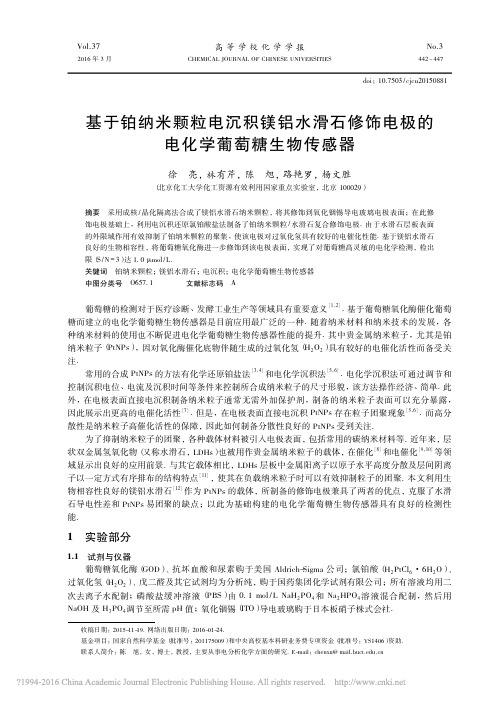
外,在电极表面直接电沉积制备纳米粒子通常无需外加保护剂 ,制备的纳米粒子表面可以充分暴露, [7 ] [5, 6 ] . 而高分 因此展示出更高的电催化活性 . 但是,在电极表面直接电沉积 PtNPs 存在粒子团聚现象 散性是纳米粒子高催化活性的保障 ,因此如何制备分散性良好的 PtNPs 受到关注. 为了抑制纳米粒子的团聚,各种载体材料被引入电极表面,包括常用的碳纳米材料等. 近年来,层 [8 ] [9, 10 ] LDHs) 也被用作贵金属纳米粒子的载体 , 在催化 和电催化 等领 状双金属氢氧化物( 又称水滑石, 域显示出良好的应用前景. 与其它载体相比,LDHs 层板中金属阳离子以原子水平高度分散及层间阴离 [11 ] 子以一定方式有序排布的结构特点 ,使其在负载纳米粒子时可以有效抑制粒子的团聚 . 本文利用生 物相容性良好的镁铝水滑石 作为 PtNPs 的载体,所制备的修饰电极兼具了两者的优点 ,克服了水滑 石导电性差和 PtNPs 易团聚的缺点; 以此为基础构建的电化学葡萄糖生物传感器具有良好的检测性 能.
[13 ]
制备镁铝水滑石. 取一定量 Mg ( NO 3 ) 2 ·6H 2 O 和
Al( NO 3 ) 3 ·9H 2 O 溶解于 100 mL 去离子水中配成混合盐溶液,其中[ Mg 2+] Al 3+] 与[ 的摩尔比为 3 ∶ 1, 金属离子总浓度为 0. 2 mol / L; 另取 1. 28 g NaOH 和 1. 06 g Na 2 CO 3 溶解于 100 mL 去离子水中配成混 合碱溶液. 将 上 述 2 种 溶 液 迅 速 混 合 于 旋 转 液 膜 成 核 反 应 器 中,快 速 搅 拌 2 min,所 得 浆 液 于 90 ℃ 水浴晶化 10 h,得到水滑石浆液,离心洗涤至 pH = 7,在 80 ℃ 下干燥得到镁铝水滑石粉末. 1.2.2 修饰电极的制备 称取 1 mg 镁铝水滑石加入去离子水中,超声分散,制得 1 mg / mL 的水滑石
- 1、下载文档前请自行甄别文档内容的完整性,平台不提供额外的编辑、内容补充、找答案等附加服务。
- 2、"仅部分预览"的文档,不可在线预览部分如存在完整性等问题,可反馈申请退款(可完整预览的文档不适用该条件!)。
- 3、如文档侵犯您的权益,请联系客服反馈,我们会尽快为您处理(人工客服工作时间:9:00-18:30)。
最优二叉查找树
Warshall 算法
算法Warshall(A[1..n,1..n]) //实现计算传递闭包的Warshall算法 //输入:包括n个顶点有向图的邻接矩阵A //输出:该有向图的传递闭包 R(0)←A for k←1 to n do for i←1 to n do for j←1 to n do R(k)[i,j] ←Rk-1[i,j]or Rk-1[i,k]and Rk-1[k,j] return R(n) Θ(n3) ; sparse graph? DFS? BFS? 比特串,位操作语句
矩阵链相乘
算法MATCHAIN 输入:n个矩阵的链的维数对应于正整数数组r[1…n+1], 其中r[1…n]是n个矩阵的行数, r[n+1]是Mn的列数。 输出:n个矩阵相乘的数量乘法的最小次数。 • • • • • • • • • • • • • 1. for i←1 to n {填充对角线d0} 2. C[i,i] ←0 3. end for 4. for d ←1 to n-1 {填充对角线d1到dn-1} 5. for i←1to n-d {填充对角线di的项目} 6. j←i+d {对角线上第i行元素的列数} 7. C[i,j] ←∞ 8. for k←i+1 to j {i,j之间的索引} 9. C[i,j] ←min{ C[i,j], C[i,k-1] + C[k,j] +r[i]r[k]r[j+1]} 10. end for 11. end for 12. end for 13. return C[1,n] Θ(n3)
• 上述说明: 如果rij(k)=1, 则: rij(k-1)=1,或 rik(k-1)=1且rkj(k-1)=1。 , 且
Warshall 算法
• 其逆命题也成立。因此,对于如何从矩阵R(k-1)的元素中生成 矩阵R(k)的元素,我们有下面的公式: rij(k)= rij(k-1) or rik(k-1) and rkj(k-1) • 该公式意味着以下规则: 如果一个元素rij在R(k-1)中是1,它在R(k)中仍然是1。 如果一个元素rij在R(k-1)中是0,当且仅当矩阵中第i行第k列的 元素和第k行第j列的元素都是1,该元素在R(k)中才能变成1。 (如图) *例
u i ∈S
u i ∈S
∑v
i
i
≤C
Байду номын сангаас
下最大。
0/1 背包问题
• 为导出递归公式, 设V[i,j] 表示从前i项{u1,u2,…,ui}中取出来的 装入体积为j的背包的物品的最大价值。这里, i的范围是从0到n, j的范围是从0到C。 • 则,要寻求的是值V[n,C]。 • 有V[0,j]对于所有j的值是0,当背包中没有物品。 V[i,0]对于所有i的值为0,当没有物品可放到容 积为0的背包里。
0/1 背包问题
都大于0时 有以下的结论: 当i和j都大于 时,有以下的结论 和 都大于 V[i,j]是下面两个量的最大值 是下面两个量的最大值: 是下面两个量的最大值 V[i-1,j]:仅用最优的方法取自{u1 ,u2 ,…,ui-1}的物品去装入体 积为j的背包所得到的价值最大值。 V[i-1,j-si]+vi:用最优的方法取自{u1 ,u2 ,…,ui-1}的物品去装入 体积为j-si的背包所得到的价值最大值加上物品ui的价值。这仅 应用于如果j≥si以及它等于把物品ui加到背包上的情况。 • 观察结论对于找出最优装背包时的值,有下面的递推式 V[i,j] = 0 若i=0或j=0 =V[i-1,j] 若j<si =Max{V[i-1,j],V[i-1,j-si]+vi} 若j≥si
Warshall 算法的主要思想
• 任何R(k)中的所有元素都可以通过它在序列(1)中 的直接前趋R(k-1)计算得到。把矩阵R(k)中第i行第j 列的元素rij(k)置为1意味着存在一条从第i个顶点到第j 个顶点的路径,路径中每一个中间顶点的编号都不 大于k: vi,每个顶点编号都不大于k的中间顶点列表,vj (2) • 对于路径(2),有两种可能: 1、路径的中间顶点列表中不包含第k个顶点,那么 这条从vi到vj的路径中顶点的编号不会大于k-1, 所以 rij(k-1)也等于1。 2、路径的中间顶点rij(k-1) 的确包含第k个顶点vk。
计算有向图的传递闭包
• 定义 一个n顶点有向图的传递闭包可以定义为一个n阶布 尔矩阵T={tij}; 如果从第i个顶点到第j个顶点之间存在一条有效的有 向路径,矩阵第i行(1≤i≤n)第j列(1≤j≤n) 的元素为1; 否则,tij为0。 • 可以通过深度优先查找和广度优先查找生成有向图 的传递闭包; 但对同一个有向图遍历了多次(需以每个顶点为起 点做一次遍历)。
max P( z1 , z 2 ,......, z n ) = Π pi ( z i )
i =1 N
N N R = z | ∑ci zi ≤ c, ∑ wi zi ≤ w, zi ≥ 0 i =1 i=1
可基于动态规划思想求解的 问题与算法
• 计算二项式系数
C (n, k ) = C (n − 1, k − 1) + C (n − 1, k )
• 最长公共子序列 L[i, j] = 0 =L[i-1, j-1] + 1 =max{ L[i, j-1], L[i-1, j]} • 矩阵链相乘
若i=0或j=0 若i>0, j>0 和ai= bj 若i>0, j>0 和ai≠ bj
min C[i, j ] = {C[i, k − 1] + C[k , j ] + ri rk rj +1} i<k≤ j
所有点对的最短路径问题
• Floyd算法,用自底向上地解以上递推式的方法来处理。 它用n+1 个n x n维矩阵D0,D1,…,Dn来计算最短约束 路径的长度。 • 开始时,如果i≠j 并且(i ,j)是G中的边,则置D0 [i,i] = 0, D0 [i,j] = l[i,j]; 否则置D0 [i,j] =∞。 • 然后做n次迭代,使在第k次迭代后,Dk [i,j]含有从顶 点i到顶点j,且不经过编号大于k的任何顶点的最短路 径的长度。这样在第k次迭代中,可以用公式
Dk [i, j ] = min{Dk −1[i, j ], Dk −1[i, k ] + Dk −1[k , j ]
计算Dk [i,j]。
*在第K次迭代中,第K行和第K列均不变,且其它元素只用K行列,故D不需做副本
所有点对的最短路径问题
算法FLOYD 输入:n x n维矩阵l[1…n,1…n], 对应于有向图G=({1,2,…,n},E) 中的边(i,j)的长度为l[i,j]。 输出:矩阵D, 使得D[i,j]等于i到j的距离。 • 1. D←l {将输入矩阵l复制到D} • 2. for k←1 to n • 3. for i←1 to n • 4. for j←1 to n • 5. D[i,j]=min{D[i,j],D[i,k] +D[k,j]} • 6. end for • 7. end for • 8. end for 显然,算法的运行时间是 Θ(n3). 图例?
a
b
a A=b c
c d
a b c d 0 1 0 0 0 0 0 1 0 0 0 0 1 0 1 0
a T=b c d
a b c d 1 1 1 1 1 1 1 1 0 0 0 0 1 1 1 1
d
Warshall 算法
• Warshall算法通过一系列n阶布尔矩阵来构造一个给定的n 个顶点有向图的传递闭包: R(0),…,R(k-1),R(k),…,R(n) (1) • 当且仅当,从第i个顶点到第j个顶点之间存在一条有向路 径(长度大于0)并且路径的每一个中间顶点的编号不大 于k时,矩阵R(k)的第i行第j列的元素rij(k)的值等于1。 • 这一系列矩阵从R(0)开始,这个矩阵不允许它的路径中 包含任何中间顶点;所以R(0)就是有向图的邻接矩阵。 • R(1)包含允许使用第一个顶点作为中间顶点的路径信息; 每一个后继矩阵相对它的前趋来说,都允许增加一个顶 点作为其路径上的顶点。 • 序列中的最后一个矩阵,反映了能够以有向图的所有n个 顶点作为中间顶点的路径,因此它就是有向图的传递闭 包。
0/1 背包问题
• 由以上递推式可以很简单地用动态规划来 求解这个整数规划问题。 • 用一个(n+1) x (C+1)的表来计算V[i, j]的值, 只需利用上面的公式逐行地填表 V[0…n,0…C]即可。
0/1 背包问题
算法KNAPSACK 输入:物品集合U= {u1,u2,…,un},体积分别为v1,v2,…,vn,容量为C的背包。 输出:∑ u ∈s vi 的最大总价值,且满足 ∑ ui ∈s si ≤ C ,其中 S ⊆ U 。 i 1. for i←0 to n 2. V[i, 0] ←0 3. end for 4. for j←0 to C 5. V[0, j] ←0 6. end for 7. for i←1 to n 8. for j←1 to C 9. V[i, j] ←V[i-1, j] 10. if si≤j then V[i, j] ←Max{V[i, j],V[i-1, j-si]+vi} 11. end for 12. end for 13. return V[n, C] Θ(nc)
所有点对的最短路径问题
• 例如d0i,j=l[i,j], d1i,j是从i到j, 除了可能经过顶 点1以外,不经过任何其他顶点的最短路径, d2i,是从i到j, 除了可能经过顶点1、顶点2或同 时经过它们以外,不经过任何其他顶点的最短 路径,等等。 • 则dni,j是从i到j的最短路径长度,也就是从i到j 的距离。给出这个定义,可以递归地计算dki,j 如下 dki,j=l[i, j] 若k = 0 =min{dk-1i,j, dk-1i,k+ dk-1k,j} 若1≤k≤n
